






Gardening is a favorite pastime for many people. But for those in the Purdue Extension Master Gardener program, plant care is serious business. Enthusiasts receive extensive training over several weeks. Then they share their knowledge with the community as volunteers for Purdue Extension.
According to James Wolff, extension director for Allen County, the program is thriving.
“The Master Gardening Program is one of our main programs with Purdue Extension. There’s a program in most counties across the state,
is one of the big events he’s involved with every May.
“There are many dozens of plants for sale at the plant sales,” Hile said. “Hostas, iris, ferns, African violets, vegetables, you name it.”
Participants who graduate from the program are required to attend yearly training and complete volunteer hours to remain certified through Purdue.
“I have two roles, which are nontraditional, I guess,” Hile said. “I am the speaker coordinator, in which, when a group from the community desires a Master Gardener speaker for their organization, I try to find someone who’s knowledgeable and

Stephenson Is Director Of A Baby’s Closet See Page 10
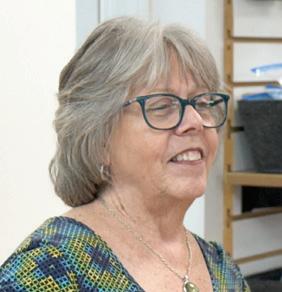
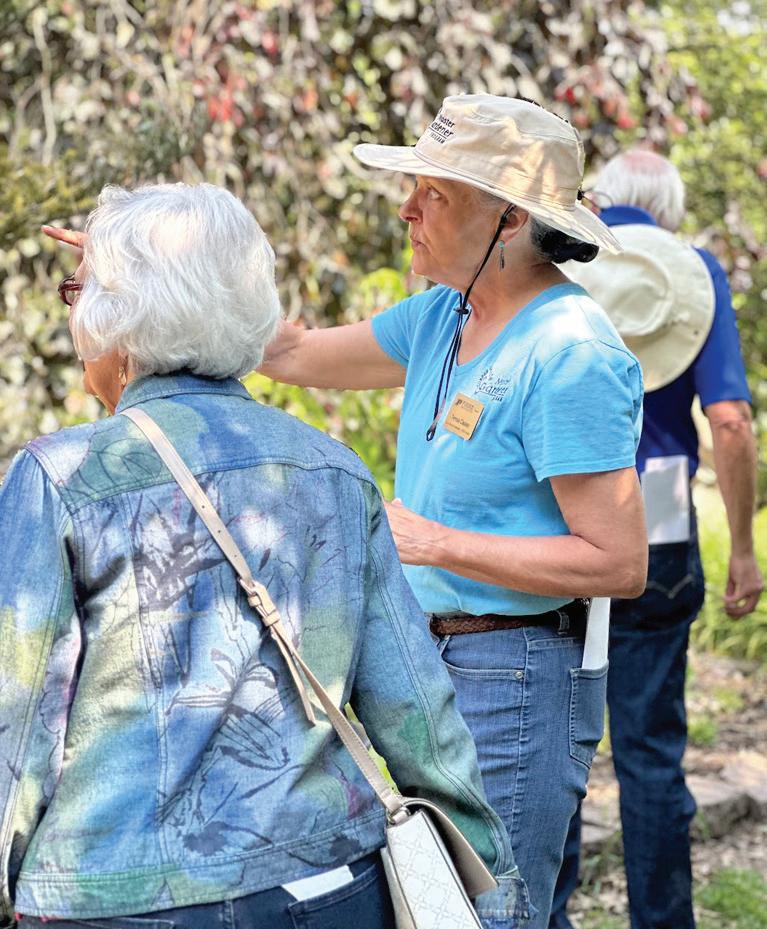
A MASTER GARDENER — Simone

He added, “The second is that I manage the display beehives we installed a couple of years ago. I am a beekeeper on the side. At the 2024 plant sale, I was there but I was selling honey and answering questions about observation hives.”
People commonly want to know about planting for pollinators, how to prepare the garden for spring, and container gardening. Hile brings his

LOOK AT THESE — Master Gardener Teresa Causey, right, talks to a woman at a recent event. Photo provided.

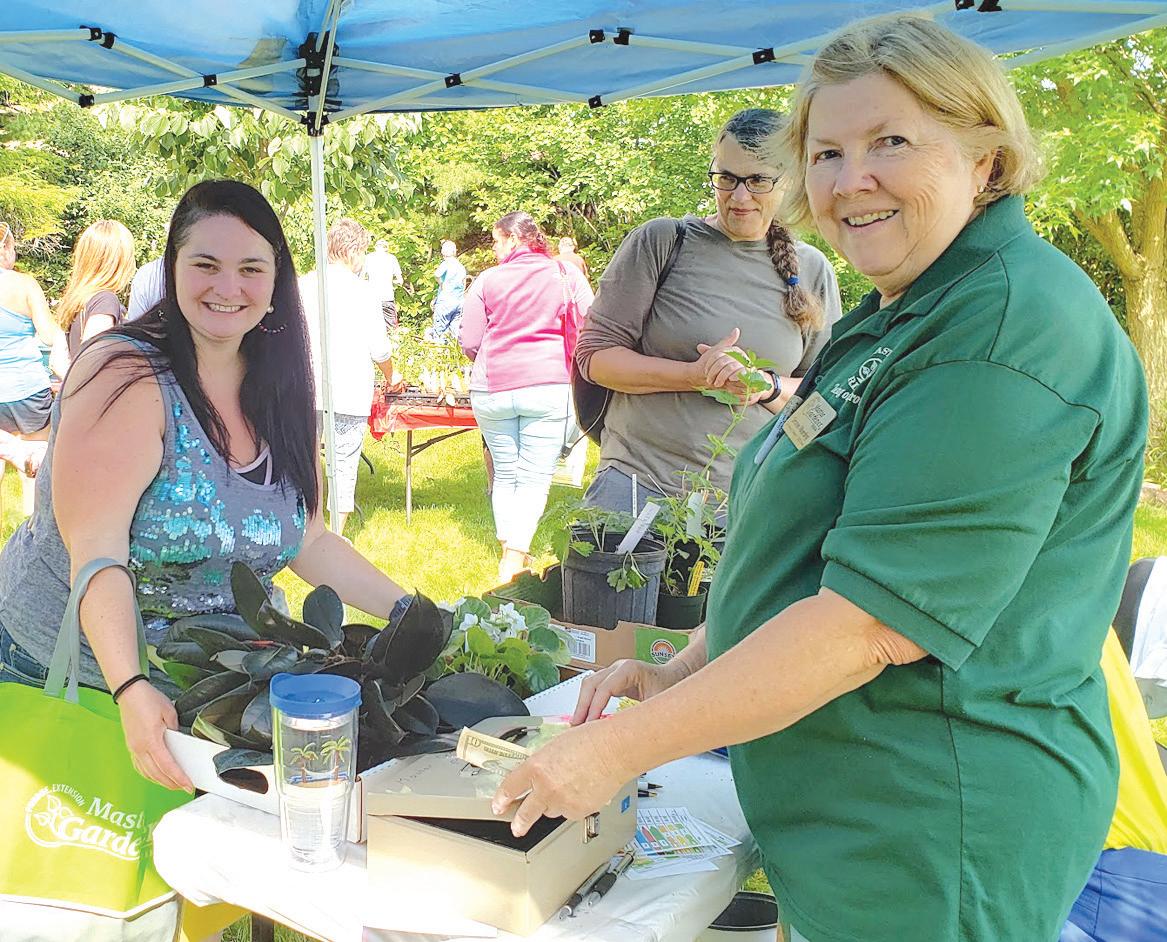


READY TO SELL — Pictured are plants that were prepped and ready to sell at the Allen County Master Gardener Plant Sale in May.


Marilyn Morgan, president of the Fort Wayne Chapter of the American Sewing Guild, characterizes her job as being a “cheerleader” for the six groups within this national organization.
“I oversee the groups to make sure they’re running smoothly, see that they keep inspired, and we are encouraging others interested in joining and learning to improve and broaden their sewing skills and techniques,” she said.
She added, “We’re probably the best kept secret in the area. We don’t advertise. Word of mouth is our best way to let people know of the good things we do for the community that most people are unaware of.”
The group makes pillow cases for Ronald McDonald House at Parkview Hospital, sews mastectomy pillows for breast cancer patients, assembles hygiene kits for women’s shelters, makes draw-string bags for school children, and does other projects as called upon.
“All our materials and labor are donated. It’s our way of giving back to our communities,” Morgan said.
The local chapter, which was chartered in 1996, has a membership total of 85 women ranging in age from 35 to 80.
“Two of our groups, perhaps the most popular ones at the moment, are dedicated to garment making and quilting,” she said.
The Sew Southwest group meets once a month at the UAW Hall, 2209 E. CR 900N, Roanoke, and three groups, Judy’s Girls, Machine Embroidery, and Piece Together, all meet at Peace Lutheran Church, Fort Wayne.
Sew Creative, of which Morgan is a member, meets at Trinity Friends Church in Van Wert, Ohio. The group does not focus on one area of sewing, but showcases all forms of sewing and fiber arts.
The Garment District group meets in members’ homes.
Information on the various groups’ meeting locations and times can be found on the Fort Wayne Chapter of the American Sewing Guild website, ASGFortWayne.org.
“I’ve noticed since COVID-19 that we have gained a number of young members who began their sewing experience making face masks. I hope this is a continuing trend. We would love to welcome new members of any age and be able to introduce
them to a variety of sewing techniques and skills, new sewing equipment, fabrics and patterns,” Morgan said.
She added, “We do not have an official teaching group, but are willing to work with neophytes who want to learn to sew or improve their present skills.”
Morgan points out that ASG is more than just sewing, quilting and making garments.
“We like to get to know each other better by socializing at our yearly four-day retreat event in Shipshewana. There we sew, shop, eat and socialize. We open our work-room doors at the hotel for visitors to drop in and ask questions and ‘admire’ our work. In addition, we sponsor carpooling ‘shop hop’ excursions to area fabric stores,” Morgan said.
Morgan, who is in her second term as president of the Fort Wayne Chapter, became a member of ASG in 1996. She was heavily involved in organizing Sew Creative in her Van Wert, Ohio, neighborhood in 2006. She learned the basics of sewing from her mother, took home economics in high school, continues to attend YouTube University, and has been sewing creatively ever since.
“There’s something to learn every day,” she added.
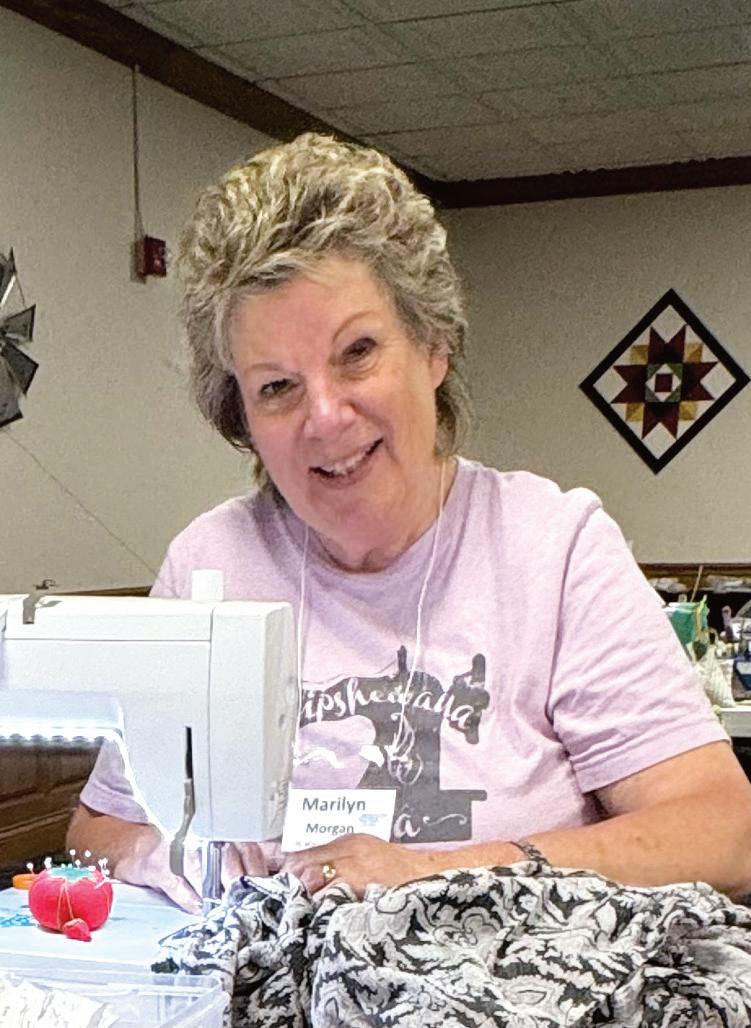


Fort Wayne Animal Care and Control is urgently asking for help from the community by becoming a foster family. FWACC is seeing a record-breaking number of kittens coming to the shelter. Currently, 64 foster families are caring for 278 cats and kittens.
“Our foster families play a vital role in helping save lives by opening their homes to animals, who need a bit of extra love and care to get them ready for their forever home,” said Director Amy-Jo Sites. “As an open-access
shelter, one of our larger populations that come in are kittens and mother cats. If one has room for a pop-up playpen, provided by us, they have space to foster.”
Fostering is completely free and foster families are provided with food, supplies, and all medi-
cal care needs; all supplies are free thanks to a private donor. All a foster family provides is a temporary loving home. Foster families will typically care for a pet for a period of a few weeks to about a month, until they reach 2 pounds and are ready to come back to the shelter for the spay/ neuter surgery to go into the adoption program. If someone is interested in becoming a foster, apply at cityoffortwayne.org/animal-careand-control.html or call (260) 427-1244.
It’s never too late or too early to start saving.
If you haven’t started, put a couple of bucks away right now.
And you never can save too much.
Saving can be as simple as pouring pennies into a piggy bank or cramming money under the mattress.
That simple stratagem should grow to include a plan to set aside and invest a certain amount of cash regularly during your earning years so you can enjoy your non-earning retirement years.
This also calls for a periodic review to see where you stand. Things change, and changes during your work and afterwork life affect how much you’re going to need.
Acquiring a non-immune disease or falling off a ladder and crushing a hip will mean higher medical bills for the rest of your life. That might mean having to increase the amount you save now to make sure you can pay all your bills when you leave the labor force.
If you’re already retired and survived a heart attack or stroke, your medical costs already have been affected so you’ll probably have to elimi-
Continued from page 1 garden and a large perennial flower garden. My philosophy is If I can’t eat it and the bees can’t eat it, I don’t grow it,” he said with a smile.
Honeybees like small flowers, like dandelions and clover, and bumble bees prefer bee balm. All bees like sunflowers. The observation hives at the extension office are always open for viewing.
“Kids really love watching the bees,” Hile said.
The Hile family are gardeners.
“My father grew African violets and when he retired, started a small plant nursery, so I’ve been around plants my entire life. I have two sons and a daughter. One of my sons enjoys gardening and growing plants but none of them care to mess with the bees,” Hile said with a laugh. “I’ve made numerous friends at the extension office and Master Gardener program. I really enjoy learning about new varieties of plants and trying to grow them. Always something new to learn.”
nate previously made travel plans from your financial budget.
Being retired doesn’t mean you can quit saving and spend to the limit you set for yourself before you quit work. You can still save money by not trading in your automobile every two or three years.
While reviewing this section of your retirement budget, consider how far you’re going to have to drive each year. If it’s minimal, you might consider eliminating the cost
of car and liability insurance, parking, monthly payments, auto maintenance and fuel by selling the vehicle. That money and the savings can buy you more than enough cab fares without the responsibility of ownership.
Many seniors have discovered trips to the grocery store no longer are a problem. They use their telephone or computer to order and the victuals are delivered — for no charge in some cases.
Other ways you can still
save in your Social Security years is to cut back on the number of times you eat out.
Cutting back on gifts for Christmas, birthdays, graduation, weddings and other special occasions can also mean savings. It does no good to make a gift or charitable donation above your means. In most cases, a card or telephone call will do.
If you feel cutting back on costs will cut into your social life, you can still have coffee with cronies, just not as
often. Volunteering your time and talent to an organization whose work you support will expand your social circle. But you’ve already sold your car, you say. Don’t worry, someone will pick you up.
Or call a cab and you’ll probably be given a ride home. These are just a few of the facets to consider when you review your savings plan, whether you’re living on it now or haven’t put away a penny yet.

Benita Steyer’s life has been entwined with her service to the Daughters of the American Revolution for over a decade. Other members are like sisters as they all share a devotion to the organization’s patriotic goals. In fact, one of the other members is her sister, Barbara

Harris. It has truly been a family affair in many ways.
“We’ve been very active in DAR since we joined. We both held officer positions yearly for 17 years. This year will be my fourth year to go to Continental Congress in Washington, D.C.,” Steyer said. “I am going with my daughter, Jenny, who has been a DAR member for five years. Jenny has been selected



as our Chapter Outstanding Junior and is chapter vice regent.”
She added, “I did the research so that our mother, mother’s twin sister, Barbara, and I could join DAR at the same time,” Steyer continued. “Our patriot was Jesse Buckner, born in Virginia. Jesse’s patriotic service was that he provided aid during the American Revolution.”
Office holders in the organization are given unique titles. In May, Steyer finished her three-year term as regent.
Independence, which will be July 4, 2026.
STAFF

“Regent is a synonym for queen,” she said.

Ron Baumgartner, Publisher rbaumgartner@the-papers com
Annette Weaver, Business Manager aweaver@the-papers com
Steve Meadows, Director Of Marketing smeadows@the-papers com
Marla Schroeder, Publication Manager mschroeder@the-papers com
Account Executive
Betty Foster slallen@the-papers com • 1-866-580-1138 Ext 2403
Commercial Printing Sales Representative
Rodger Salinas rsalinas@the-papers com
Commercial Printing Customer Service
Tina Kaplan tkaplan@the-papers com
Rich Krygowski rkrygowski@the-papers com
Deb Patterson, Editor-In-Chief dpatterson@the-papers com
Phoebe Muthart, Editor pmuthart@the-papers com
Jerry Long, Circulation Manager jlong@the-papers com EDITORIAL DEADLINES Elkhart/Kosciusko
SUBSCRIPTIONS
Mailed subscriptions are available, prepaid with order at $37 for one year; and $64 for two years (Select one edition ) Your cancelled check will serve as your receipt ADVERTISING
For advertising deadlines call your sales representative The existence of advertising in Senior Life is not meant as an endorsement of any product, services or individuals by anyone except the advertisers Signed letters or columns are the opinion of the writers, and not necessarily the opinion of the publishers To advertise contact Betty Foster at 260-494-9321 or slallen@the-papers.com. PRODUCTION
From the beginning, she started and has overseen the Children of the American Revolution William Berry Society for those under age 22.
Currently, she is chairman of the group’s sesquicentennial celebration. She’s already kicked off her duties: scheduling events associated with the festivities to commemorate the 250th anniversary of the signing of the Declaration of
In November, the American Battlefield Trust Exhibit will be coming to the Allen County Public Library. Her branch, formally called the Mary Penrose Wayne NSDAR Chapter, was instrumental in bringing “The American Revolution Experience Travelling Exhibition on Tour,” It is a multi-media exhibit with interactive digital kiosks and unique artifacts, aimed to connect modern audiences with the people and places that shaped the birth of the nation.
The exhibit will be open at the library from Nov. 8-15.
The hours are 9 a.m. to 9 p.m. Monday to Thursday, 9 a.m. to 6 p.m. Friday and Saturday, and noon to 5 p.m. Sunday.
The educational aspects of being in DAR come naturally to Steyer.
“Our mother, Mary Sheets, taught at Maplewood Elementary School for 30 years, and our father, Don Sheets, worked at Bowmar Instruments,” she
said. “Our grandmother was a one-room schoolhouse teacher in North Dakota. Like our mother and grandmother, Barb and I are both retired teachers.”
The two sisters’ husbands, Marvin Steyer and Brian Harris, are among their supporters, as are their children and grandchildren. Steyer has another current pet project for DAR.
“We are working on the cemetery restoration of Oak Grove Cemetery, 6606 Sleepy Hollow Lane,” she said. “We have a group of volunteers made up of the DAR, Sons of the American Revolution, Purdue Fort Wayne students, and neighbors to the cemetery. We are in the process of clearing brushes and cleaning tombstones. We will need help from the community to pay for headstone repairs.”
“These three years have been the most thrilling and exciting,” she said. “We truly are dedicated to patriotism, education, and historic preservation of our community, which is our NSDAR mission.”

Tom Wood has spent many, many hours playing golf and has won numerous tournaments. But the time when he was unable to play, due to severe injuries, might have taught him the most about the game and about life.
“I’ve been playing golf since I was 10,” said Wood, who is 65. “In 1999, at age 40, my wife and I got in a very bad car accident. We were hit by a drunk driver.”
The couple ended up in the emergency room and while his wife, Lisa, was hurt, he had the most serious injuries and spent time in the I.C.U. Eventually, he was confined to a wheelchair for a few weeks, and had several surgeries to repair the damage. To this day, there are five plates and 26 screws with him every day.
“In the E.R., my wife asked, ‘Will he be able to play golf?’” he said.
It wasn’t that golf was more important than life, he said, but it was her way of asking, “Will he recover?”
She had good reason to wonder. The wreck could have been
fatal. He later learned that a dear friend, who is a priest, had given him last rites in the E.R. In fact, Wood was in such bad shape that the friend did not recognize him immediately after the crash.
“You learn very early, it’s all about the journey . . . .That adds a whole different perspective,” he said.
After he recovered, he accommodated for the metal in his hip by no longer walking the course, but by riding in a golf cart.
“To be able to play competitively is a gift from God,” he said.
He and Lisa, who will celebrate 42 years of marriage in July, have a daughter and two sons, and their “boys” play golf. The couple are the grandparents of seven. Both of them went to Purdue University for pharmacy degrees and have now retired from careers as pharmacists. He’s originally from Gary and Fort Wayne is her home town.
“I love golf. For years when my kids were growing up, we never did anything with golf in the winter,” he said. “It was all about spring break and family time.”
Now, he and Lisa both play and have been members of Pine Valley nearly 30 years. The senior players are under the same umbrella as the Fort Wayne Golf Association now. He has won multiple tournaments, including the Pine Valley Senior Club championship and city tournaments multiple times, among many other accomplishments.
Golf is like life, and he will often share this message with his family: There’s only two things we control, our effort and our attitude.
Since retiring, part of his way of giving back is to substitute teach in the 11 Catholic schools in the area. He will teach any subject and any grade level. He has taught music, kindergarteners, and everything in between.
Through it all, golf remains his passion.
“Fort Wayne has more really good golfers per capita than a lot of other cities of our size,” Wood said. “My whole thing is you don’t play against a player, you play against the golf course. There’s a luck in the game. In any given day, anybody can beat anybody else.”
Using a lawn mower can be as routine as barbecuing or bike-riding, but people often find themselves in terrifying situations with these seemingly safe household machines.
In fact, more than 250,000 people are injured and 75 are killed in lawn mower-related accidents each year, reports the U.S. Consumer Product Safety Commission.
Lawn mowers don’t attack on their own. Most injuries, such as severed fingers and toes, limb amputations, broken bones, burns and eye injuries, are caused by careless use and can be prevented by following a few simple safety tips.
“Power lawn mowers are dangerous adult tools, but many children, and sometimes adults unfortunately, see them as toys,” said Dr. John Canady, past president of the American Society of Plastic Surgeons. “Lawn-mowing can be dangerous to the operator as well as those nearby if proper safety precautions aren’t taken. Physicians in this coalition often repair these heartwrenching injuries, and we feel it’s our duty to help people avoid these accidents in the first place.”
The ASPS offers the following tips to help prevent lawn mower-related injuries:
• Children should be at least 12 years old before they operate any lawn mower, and at least 16 years old for a sitdown mower.
• Children should never be
passengers on sit-down mowers.
• Always wear sturdy shoes, not sandals, while mowing.
•Young children should be at a safe distance from the area you are mowing.
• Pick up stones, toys, and debris from the lawn to prevent injuries from flying objects.
• Always wear eye and hearing protectors.
•Use a mower that stops moving forward when the handle is released.
• Never pull backward or mow in reverse unless abso-
lutely necessary. Look behind you carefully when you do.
• Start and refuel mowers outdoors, not in a garage. Refuel with the motor turned off and cool.
• Blade settings should be set by an adult only.
• Wait for blades to stop completely before removing the grass catcher, unclogging the discharge chute, or crossing gravel roads. Some newer models have a blade/brake clutch that stops the blade when the operator releases the handle
Mature Life Features Copyright 2024
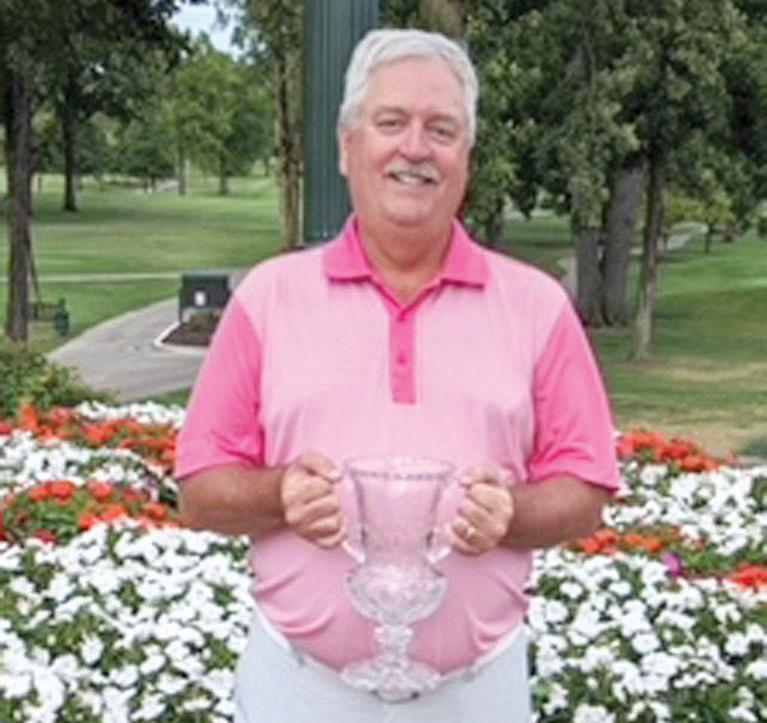








A. When thinking about estate planning, it may seem confusing to determine what documents should be prepared. But the truth is, with the assistance of an elder law attorney it’s quite simple. There are two different purposes of estate planning documents either to dictate the distribution and management of assets after death or assignment of authority to manage assets and decisions on behalf of someone who cannot do so for themselves.
The first essential document is a Will. This document will appoint a personal representative. This person will oversee the management of your estate and carrying out your final wishes. The Will also dictates what your final wishes are and can establish specific gifts you wish to leave anyone. The next essential estate document is a power of attorney. This document appoints someone to make financial and legal decisions if you are unable. Third is the appointment of
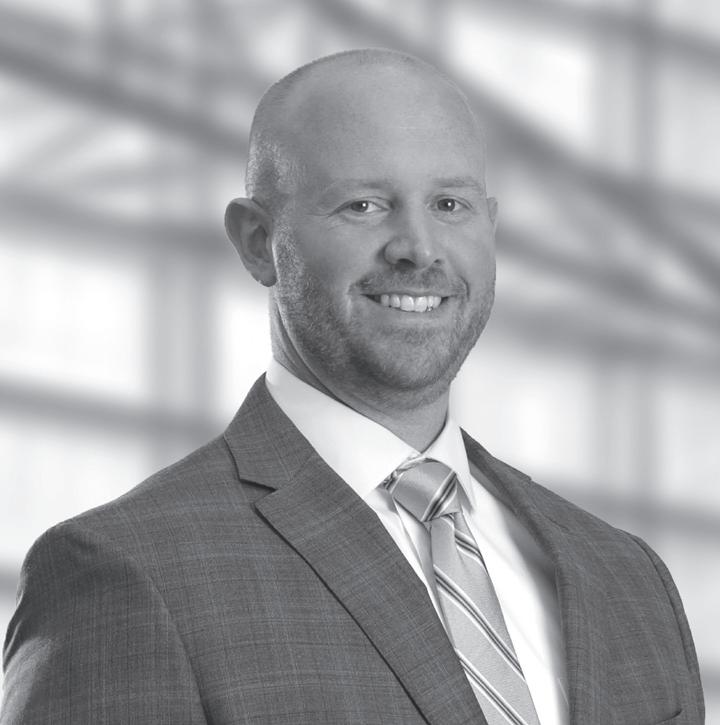 Ryan M. Gardner Attorney at Law and Partner
Ryan M. Gardner Attorney at Law and Partner
a healthcare representative. This is the person who makes healthcare decisions for you in the event you are unable to do so for yourself. Finally, while not essential but very helpful for your care providers and family, is an advanced directive, which is often referred to as a Living Will.
Each of these documents play a specific and separate role for anyone’s planning needs. While none of these documents require the other, together they form the complete essential set of documents which anyone considering estate planning should have.

DISCLAIMER: Ryan M. Gardner and Beers Mallers, LLP Attorneys At Law, appreciate the opportunity to provide insight into legal topics of interest. The content of this article is designed to provide information of general interest to the public and is not intended to offer legal advice about specific situations or problems. Ryan M. Gardner and Beers Mallers, LLP Attorneys At Law, do not intend to create an attorney-client relationship by offering this information, and anyone’s review of the information shall not be deemed to create such a relationship. You should consult a lawyer if you have a legal matter requiring attention. Ryan M. Gardner and Beers Mallers, LLP Attorneys At Law, also advise that any information you send to this newsletter shall not be deemed secure or confidential. Please visit our office to ensure complete confidentiality.
Q.
A. I can say with unequivocal confidence that if you are enrolled in a Medicare Advantage plan that includes prescription drug coverage (MAPD) or a stand-alone prescription drug plan (PDP), your plan will be changing for 2025.
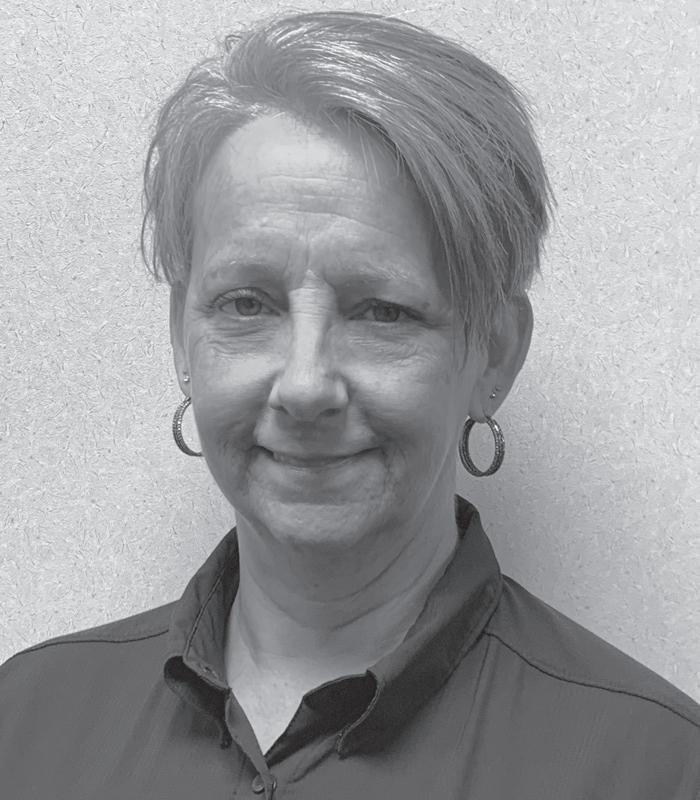
On April 1st, the Centers for Medicare & Medicaid Services (CMS) released the Final Calendar Year 2025 Part D Redesign Program Instructions that include guidance on what to expect for 2025 Medicare Prescription Drug Plans. We know that the infamous “donut hole” will cease to exist, and Medicare Beneficiaries will be capped at $2,000 for their out-of-pocket drug costs. The “stages” that will apply for drug coverage will include a Deductible (up to $590) and then 25% cost-sharing. What we don’t know at this time is if Plan Sponsors will be permitted to offer plans that have drugs not subject to Deductible or 25% cost-sharing. Stay tuned for more…

Have questions? Give our office a call at (260) 484-7010 to learn more about what your Medicare Advantage plan includes. 3609 Lake Avenue
A. Several years ago, some friends whom had moved from their home to a local retirement community had an interesting conversation with me regarding their experiences in making their transition. One of the things that stood out in my mind was the fact that very little of the things they needed done was completed on a schedule that fit their needs. Also, coordinating all of the things that they needed to do was a bit overwhelming. And then it struck me that nearly everything that they needed accomplished were exactly what I was doing or had training in.
Having many years of experience in moving furniture in my younger years, a successful career in real estate, and a successful career in auctioneering and appraising, it didn’t take me long to see that all of my abilities were just what the doctor ordered for my friends. Hence the term “Senior Relocation” was born.

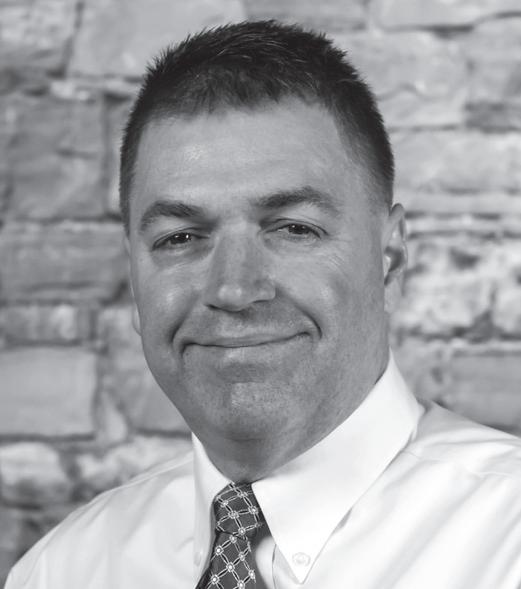
Our systems include professional and courteous moving services, real estate brokerage, real estate and antique appraisals, auctioneering services, floor planning assistance and climate controlled storage. These services are all geared to assist the mature adult market in helping make the transition to retirement living much easier.
Whether you need all of our services or just a few, you can feel free to call us for a free analysis. We can show you how to sell your home in 30 days for your price, coordinate a professional and courteous move, along with any other services you may need to help your transition be as simple and as worry free as possible. Call (260) 441-8636 for a free consultation.
TimMcCulloch, Owner



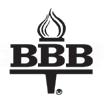
Q. What should I do if I suspect someone is a victim of elder abuse?
Q. What can I do to prepare and ensure my end-of-life wishes are followed?
A. Anyone can be a victim of abuse, but older adults who are dependent on others are at greater risk. More than 10% of adults over the age of 65 will experience elder abuse in a given year (U.S. Department of Justice).
A. Advance Care Planning (ACP) is the process by which you determine your wishes in regard to medical care and treatment. This process is a series of conversations you have with your loved ones about those wishes so that someone can speak for you when you cannot speak for yourself.
Abuse comes in many forms. It can be physical, verbal, financial or simply neglect. Knowing the signs of elder abuse can help you determine if a person is in an abusive situation. Be on the lookout for:
It is important that during your ACP conversations, you appoint someone you trust to speak on your behalf and that person is called a Health Care Representative.
• Unexplained injuries
• Changes in behavior
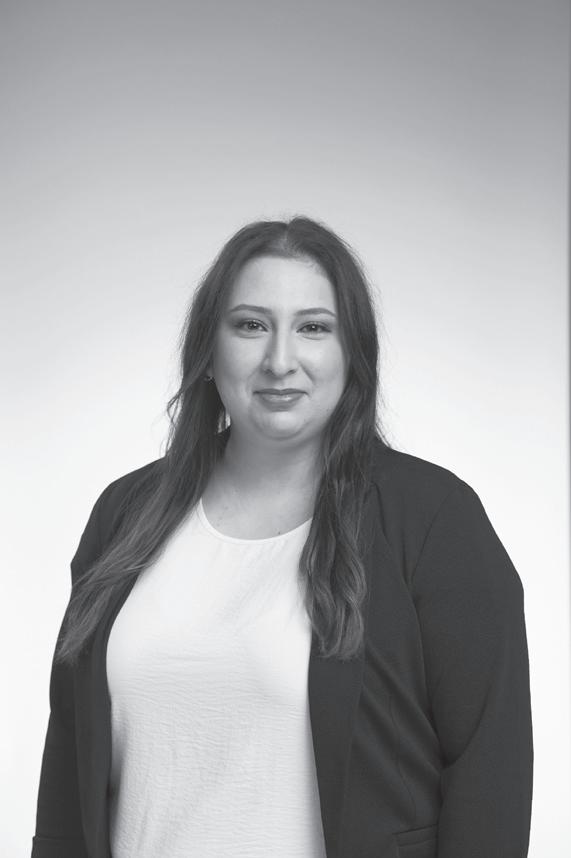
Jessica Duran ADRC Supervisor 260-745-1200
Katie Hougham Vice President, PACE Operations 260-745-1200 Ext. 450
Do not attempt to confront the suspected abuser yourself, this may only worsen the situation.
There are no “rules” or eligibility requirements regarding age or health status to begin your own Advance Care Planning. ACP is always evolving, both personally and legislatively. It is encouraged to update your wishes as your personal and health situations change. For example, if your marital status changes or if your health declines or improves you may want to adjust accordingly.
• Refusal of caregiver to allow private conversations
• Changes in finances
• Extreme weight loss Complaints of improper treatment
If you suspect someone is being abused, contact Adult Protective Services. You can submit a report online at www.in.gov/ fssa/da/adult-protective-services/ or call 800-992-6978.
At AIHS we incorporate ACP into all of our programs. We have resources available to help you walk through this conversation with your loved ones. We also have trained staff available to help facilitate these conversations. We know these conversations aren’t always easy to have, but they are essential for maintaining the integrity of your wishes. Just Call Us if you need help starting your own ACP conversation.
If you are a caregiver feeling stressed or burnt out, you may be at risk of becoming abusive. Aging & In-Home Services offers support to help reduce the caregiver burden. Just Call Us if you are in need of assistance!
I think we can all agree that going to a warmer climate (or at least a bit more picturesque one) for a vacation is a wonderful experience. Sitting poolside and getting served our favorite
beverage, having someone prepare our meals and clean up the mess is music to my ears. But if you are like me, after only a few days of this pampering, I begin to miss being home. I miss my routine, my gardening, my dogs and cats, my “things” and, of course, my own bed. In their own special way, these things that I miss are my source of comfort
or “therapy.”
The same holds true for many people, who experience a major accident or health incident, which results in a hospital stay and subsequent rehabilitation. I would venture to say that most in this type of situation miss home almost immediately. These traumatic experiences do not always require treatment in a facility,
and many times, individuals recover more quickly when they can rehab in the comfort of their own home.
Use of a home health care agency services just might be a better option to aid in successful recovery or rehabilitation. Home health care services are generally covered by original Medicare and even Medicare Advantage plans. Take some
time to discuss with your family members to determine in advance what the preferred method would be for you if the need arises.
If you need help sorting out how your Medicare plan covers home health care, me and my staff would be more than happy to go through your plan with you. Give us a call at (260) 484-7010.
(StatePoint) If you are looking for a way to beat the heat this summer, visit Kentucky and cool off on the water, in the water, or both. Whether you are looking to relax for a few days, or find some adventure exploring, Kentucky has everything you could want for aquatic adventures.
Spend a few days relaxing at Lake Cumberland floating on the placid waters of one of Kentucky’s most beautiful bodies of water. Better yet, rent a houseboat and enjoy the full experience of lake life.
Houseboats are avail-

able to rent from numerous marinas on lakes across the state, but Lake Cumberland is known as the “Houseboating Capital of the World” and has the country’s largest fleet of rental houseboats. Discover the perfect vessel, from a tiny houseboat for two to 90-foot boats that can fit your entire extended family. Many come with amenities, like air conditioning, full kitchens, TVs, private staterooms and even hot tubs and water slides.
Interested in a little more excitement? Try the flat waters at Grayson Lake State
Park for stand-up paddleboards, or canoe the rapids at Breaks Interstate Park, from relatively easy Class II and III rapids, to the high adventure Class VI.
Like fishing? Whether you want to cast from the river bank, john boat, or stand waist-deep in the water, you could spend years fishing all around the commonwealth and still not hit all the amazing fishing spots in Kentucky’s creeks, dams and lakes.
For those looking for a sailing adventure, check out the Land Between The Lakes
National Recreation Area. With Kentucky Lake on one side and Lake Barkley on the other, there is more than 300 miles worth of open water to explore.
Kentucky has plenty of options for those who want to take their aquatic adventures below the surface.Pennyroyal Scuba Center Blue Springs Resort in Hopkinsville is a one-stop shop for all things scuba. Offering certification classes, and selling just about any piece of scuba equipment you might need, this diver’s paradise features a 22-acre,
120-foot deep spring-fed quarry with dozens of diverinterest objects placed at various underwater depths. All of them are easy to find and easy to photograph with a waterproofed smartphone.
The options for aquatic adventures in Kentucky do not stop here. To learn more and to plan a trip, visit kentuckytourism.com.
Whether you are going north, south, east, west, on top of the water, below the water or just standing near the water; Kentucky has the perfect water-themed vacation for you.









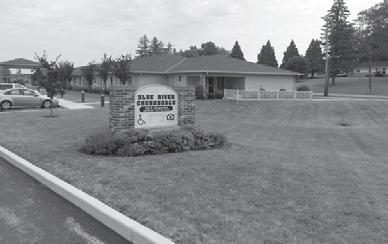

















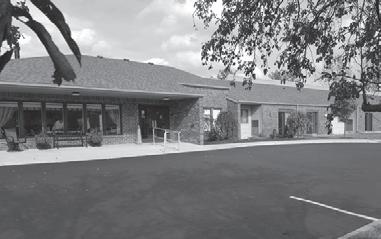



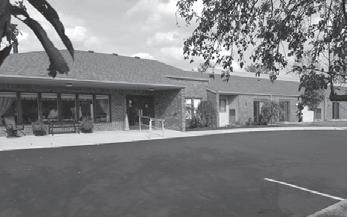


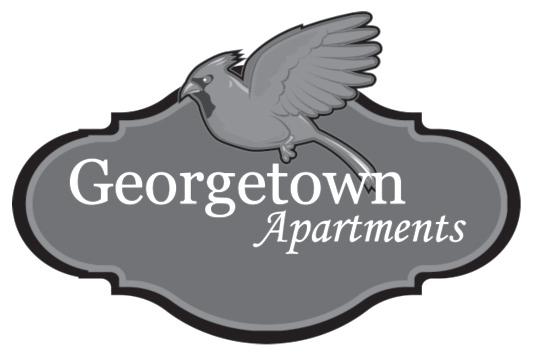
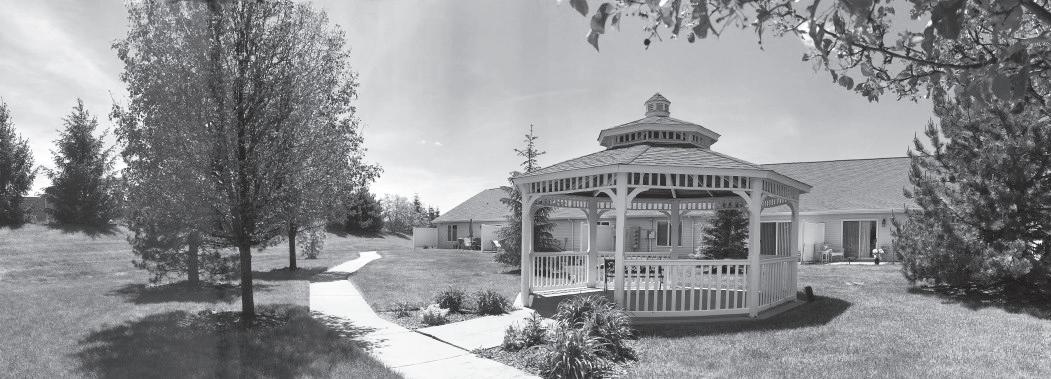
Editor’s Note: Send listings of events, for nonprofit organizations only, to Senior Life, P.O. Box 188, Milford, IN 46542 or email Editor Phoebe Muthart by the 20th of each month to pmuthart@the-papers.com. With the listing, include the contact person, area code and phone number.
—o—
Woodlands Senior Activity Center
The center is located at 710 N. Opportunity Drive, Columbia City. For more information, call (260) 248-8944 or visit whitleycountycouncilonaging. org/woodlands-activity-center.
9:30 a.m. Wednesday, pixie bingo
9-10 a.m. Monday, Wednesday and Friday, line dancing
9-10 a.m. Tuesday and Friday, euchre
9 a.m. every Tuesday, Bible study with Cheryl 10-11 a.m. Wednesday, chair exercise
Noon, every Tuesday, dominoes
12:30 p.m. Wednesday, hand and foot card game
—o—
McMillian Park Community Center
For information, visit fortwayneparks.org or call (260) 427-6000. The center is located at 3901 Abbott St., Fort Wayne. Pickleball, 9 a.m. to 2 p.m. Monday to Friday
Senior/adult yoga, 6-7 p.m. Tuesday and noon to 1 p.m.
Wednesday CardioFit, 6:30-7:30 p.m.
Monday and noon to 1 p.m. Thursday
Adult/open gym/volleyball, 6-8 p.m. Monday through Thursday
Essential steps, 5:30-6:30 p.m. Monday and 6-8 p.m. Wednesday
—o—
Fort Wayne Parks and Recreation announces that Foellinger Theatre will host Lee Brice Thursday, Aug. 8. For all general and in-person ticket sales, visit the Parks and Recreation Department, 705 East State Blvd. or FoellingerTheatre.org.
The 15th Annual Outdoor Flea Market and Bazaar,
hosted by American Legion Auxiliary Unit 241, is from 9 a.m. to 2 p.m. Saturday, June 8, at 7605 Bluffton Road, Fort Wayne.
Cost: spaces $15, tables are $5 if needed.
For reservations call (260) 431-7183 or (260) 751-8021.
Proceeds from selling spaces and food will benefit veterans and families and local charities. Public is welcome.
—o—
“Dani Kiefer: Wild and Free,” until June 22, during public hours, at Foellinger Freimann Botanical Conservatory, 1100 S. Calhoun St., Fort Wayne. Kiefer is a teacher, graphic designer, illustrator and fine artist.
—o—
Color in Motion: Live But-
terfly Exhibit, until June 23, during public hours, at Foellinger-Freimann Botanical Conservatory, 1100 S. Calhoun St., Fort Wayne.
—o—
Fort Wayne Parks and Recreation announces that the Foellinger Theatre will host multigenre artist, Gladys Knight, at 7:30 p.m. Saturday, Aug. 17. Pre-sale tickets are available from 10 a.m. to 10 p.m. with code SUMMER at ticketmaster.com/ event/050060AA3B4382E7. All general and in-person sales are also at the Parks and Recreation Department, 705 East State Blvd. For more information, visit foellingertheatre.org and click on purchase theatre tickets.
If you’re planning to camp this summer, especially if you’re heading to campgrounds
in the popular state parks, you need to keep some things in mind to help you find a spot and have an enjoyable layover.
The following advice is offered by the California Depart-
ment of Parks and Recreation, but is probably applicable in most parts of the country.
• Decide where you want to camp, but stay flexible. Have an alternative park in mind in
The Sweet Breeze canal boat replica has been launched into the St. Mary’s River. Through a partnership with Friends of the Rivers, tours began May 25. Tickets are on sale now and can be reserved by calling (260) 4276000 or via RideSweetBreeze.org.
Sweet Breeze riders will
explore natural river wonders on a replica canal boat as they are entertained with colorful river lore stories, history, and muddy water tales. Speciality tours and events are expanded for the 2024 season, including a morning bird watching tour Saturday, June 1.
The replica canal boat is fully accessible for wheelchairs. Private tour options are also available.
Full details about Sweet Breeze Boat general and speciality tours are available at RideSweetBreeze.org, or visit FortWayneParks.org.
Organ recitals, sponsored by the Germanfest Committee and the Fort Wayne Chapter of the American Guild of Organists, will be given from June 3-7.
These pipe organ recitals are free and feature approximately 30 minutes of German organ music. The organ recitals have a long tradition of being part of the Germanfest celebration across the city. Generally, the door closest to the parking area is the door to enter. The recitals are scheduled at 12:15 p.m. each day to enable people to attend on their lunch hour and last 30 minutes. All locations are

in Fort Wayne. The 2024 schedule is:
June 3, Emmanuel Lutheran Church, 917 W. Jefferson Blvd. John Palmer and Tim Robison, organists.
June 4, Trinity English Lutheran Church, 450 W. Washington Blvd. Bob Hobby, organist.
June 5, First Wayne Street United Methodist Church, 300 E. Wayne St. `Dr. Geof-
frey North, organist.
June 6, Cathedral of the Immaculate Conception, 1122 S. Clinton St. Michael Dulac, organist.
June 7, Trinity Episcopal Church, 611 W. Berry St. Gabriel Ackerman, organist.
More information about these concerts and Fort Wayne Chapter of the American Guild of Organists can be found at fortwayneago.com.
The Audio Reading Service is for individuals of any age with visual, physical, learning, or language challenges to reading printed materials. This is a free service of the Allen County Public Library. CONTACT US:
(260) 421-1376

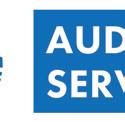


case your first choice is fully booked.
• If all the sites are full when you try to make a reservation, look for a first-come, firstserved campground and try to get there on a Tuesday or Wednesday, traditionally the quietest days of the week, to maximize your chances of finding a site.
• Consider less popular campgrounds. If campgrounds in one area draw large crowds, look for campgrounds a bit farther from major metropolitan

areas, and perhaps somewhere where the weather is not quite as good.
• Avoid major holiday weekends, when crowds are guaranteed in many popular areas.
• Do your camping during the shoulder season, that time between the most popular and least popular months. In many areas, that means parts of spring or fall.
• If you still can’t find an open space, check back at regular intervals for any cancellations.
Mature Life Features Copyright 2024
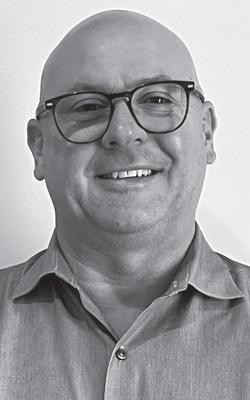










Vicki Stephenson has spent several years volunteering and working as director of a Fort Wayne nonprofit organization called A Baby’s Closet.
Stephenson has been director two different times, due to living in New York for awhile to be with family. In 2022, she returned, volunteered, and then was named director at A Baby’s Closet again.
“In 2018, I was led to accept a position as director of A Baby’s Closet, one of the ministries of Associated Churches,” Stephenson said.
A Baby’s Closet was created about 30 years ago as a way of combating the very poor infant mortality which has plagued the area for many years, she said.
“A Baby’s Closet is very special because we are not giving a hand out to families but rewarding them for attempting to safely and adequately care for themselves and their children,” she said.
Currently, it has 20 community partners, which provide parents with a coupon for prenatal visits, well baby visits, and classes such as parenting, breast feeding, safe sleep, smoking cessation, and nutrition. The parents bring their coupons to A Baby’s Closet and exchange them for essential baby items.
Stephenson’s faith has played prominently in her life.



Much of the time, she worked alongside her late husband, Gary, to whom she was married for nearly 45 years, until his death in 2015. During their marriage, she worked for several years in corporate retirement planning, which she enjoyed. But they later shared a new calling.
“As the years passed, my husband and I had several opportunities to support nonprofit agencies and participate in mission trips through our church,” she said. “I soon began to realize that the job I was working was not answering the call to ministry that I felt in my heart. In 2001, God called my husband and I to be missionaries in the southeast part of Kentucky called Appalachia for 12 and a half years. Our focus at that time was on Matthew 25:40 which says, ‘Assuredly, I say to you, inasmuch as you did it for the least of these my brethren, you did it to Me.’”
The couple was called back to Fort Wayne and soon after, Gary passed away.
“My life definitely changed but not my desire to serve people,” Stephenson said. “John 13:34 says, ‘A new commandment I give to you, that you love one another; as I have loved you, that you also love one another.’ I prayed and asked God to reveal his will to me. Answers may not always be immediate, but they will come. I was blessed to be a foster mom and work for my church as an administrative assistant
June 3
Lutheran Church 917 West Jefferson Boulevard, 46802 John Palmer & Tim Robison, Organists
June 4 Trinity English Lutheran Church 450 West Washington Boulevard, 46802 Bob Hobby, Organist
June 5
Wayne Street United Methodist Church 300 East Wayne Street, 46802 Dr. Geoffrey North, Organist
June 6 Cathedral of the Immaculate Conception 1102 South Clinton Street, 46802 Michael Dulac, Organist
June 7
Episcopal Church 611 West Berry Street, 46802 Gabriel Ackerman, Organist


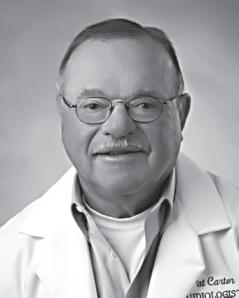
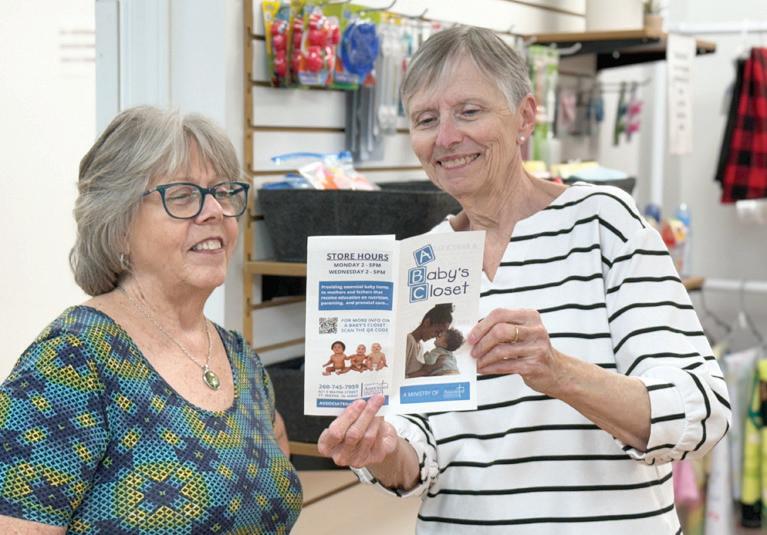
and ministry coordinator.”
Her work at A Baby’s Closet means great deal to her, she said.
“It’s my heart,” she said. “In 2023, we served 1,944 families, which was a 111% increase
from 2022. Every week, we experience an increase in our client base. Many families are experiencing hardships and greatly benefit from this ministry.”
Working with a faith organi-
zation is important to Stephenson. She considers it like being part of a family.
“My goal in life is to focus on whether I am pleasing Christ and doing what he is calling me to do,” she said.
As the aging population expands, its care and caregivers are diminishing.
In other words, it’s getting more difficult to provide the staff and services to care for the growing number of elderly.
Some 10,000 baby boomers celebrate their 65th birthday every day. By the end of this decade, the population will be made up of more than 75 million people 65 years and older.
Finding space to care for seniors and finding people to care for them is already a problem.
This increases the demand for in-home care at a time when the breakdown of family has exacerbated the problem by shrinking the supply of family caregivers.
“Families have fewer children, older adults are more


likely to have never married or to be divorced and adult children often live far from their parents or may be caring for more than one adult or their own children,” noted a 2016 study by the National Academy of Sciences.
At the same time, the stress takes its toll — some 30% of caregivers die before their patient.
Long gone are the days when everyone was born, raised and died on the family farm.
The nation needs somewhere near two and a half million additional healthcare workers, from physicians to lab technicians, in the next five years to take care of its aging population.
No one expects that to happen.
If you haven’t already, it’s time to talk about what’s going to happen to you, whether




you’re the senior or a sibling, son or daughter of a senior. Hiring someone to help can cost hundreds of dollars a day.
Old folks face several health issues: faulty hearing, fading eyesight, arthritic joints, memory loss and confusion, crippling disease and a host of unexpected disabilities.
Discuss ailments, concerns, availability, schedules, medications and all other facets of each other’s day-to-day living so you can make a reasonable decision on just how much you can offer as a caregiver or expect as the person being cared for.
The caregiver should start attending doctor’s appointments with the patient and take an active role in any prescribed treatments. You can make your job easier as caregiver by assuring the patient you’re just a phone call away and that you’re monitoring their medications, program, and progress. Ask them to help you by keeping a log or journal you can go over with them. This also helps keep them more alert and able as they age.
Develop an online connection with all the doctors, clinics and medical centers through their patient portals, which you can sign on to after getting the patient’s proxy permission.
Mature Life Features Copyright 2024
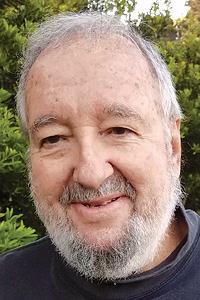 By RANDAL C. HILL
By RANDAL C. HILL
In 1978, after producing two poorly selling Village People albums that featured only a lead singer (Victor Willis) and some session musicians, French record producer Jacques Morali experienced an epiphany for his third effort: a Casablanca Records album called “Cruisin.’ ” And included in that breakthrough disc would be a megahit single that would knock down pop-culture barriers as it rocketed onto hit charts worldwide.
Jacques had recently strolled through Manhattan’s Chelsea neighborhood when he noticed the YMCA building on 23rd Street. As the YMCA was unknown to Europeans, he inquired inside and learned that the place offered inexpensive rooms and a safe haven for young men visitors.
When he learned later that it was also a place for gay men to connect, Morali sought to create a song to fit his little-known
To a senior community in a quiet northeast residential setting
group. Jacques created most of “YMCA” in about 20 minutes, then handed everything to Willis and told him to add some lyrics. Victor did just that —with a later quite-surprising admission.
Morali had wanted to exploit the burgeoning New York disco scene, which was primarily confined to gay dance clubs in Greenwich Village (hence the act name Village People). Following a clever plan of action he had devised, Morali assembled a fiveman group after advertising in a local music publication. “Macho types wanted,” it stated. “Must dance and have a mustache.”
To sell “YMCA” as a campy song-and-dance number, Morali created a video portraying the Village People as a bunch of fun-loving guys who poked fun at macho-gay-fantasy personas.
The new version of the Village People included African American Willis (seen in videos as either a cop or a naval officer), Felipe Rose as the Indian chief, David Hodo as the construction worker, Randy Jones as the cowboy, Glenn Hughes as the leather-clad biker, and Alex Briley as the Black soldier. Straight? Gay? Who cared? Fun was the focus here:
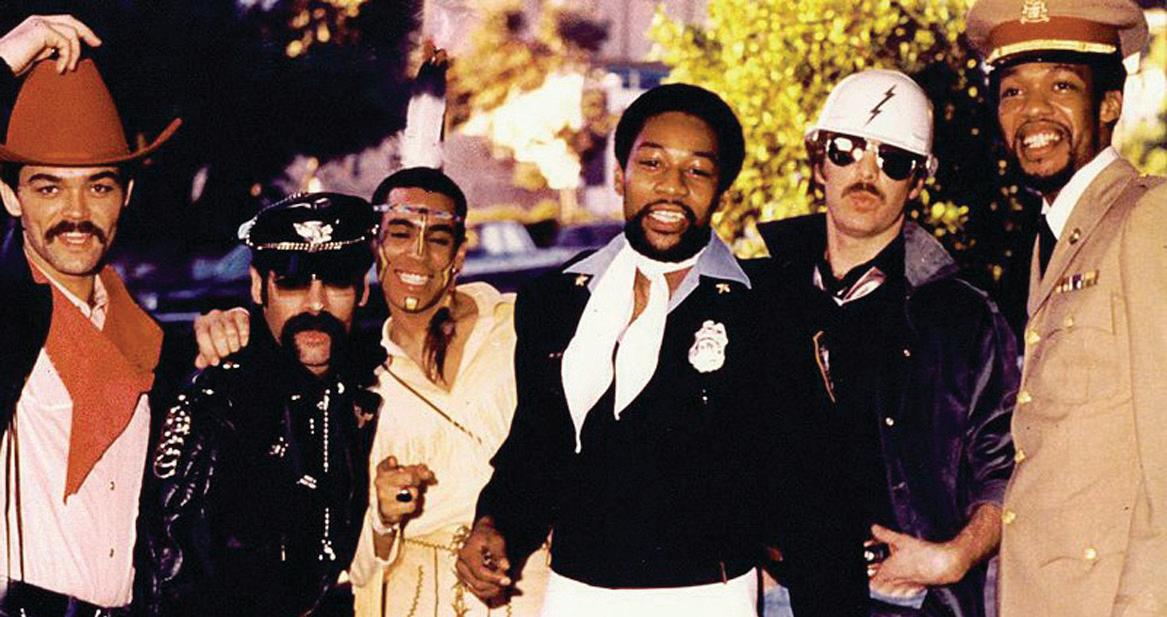
“Young man, there’s a place you can go
“I said, young man, when you’re short on your dough
“You can stay there and I’m sure you can find
“Many ways to have a good time
“It’s fun to stay at the YMCA.”
“YMCA” became one of fewer than 40 singles to sell more than 10 million copies. It’s still
a mainstay in ads, movies and television, and at weddings, parties and sporting events, funlovers sometimes do the YMCA dance by waving their arms to spell out the letters.
In a 2017 interview, Victor Willis, a preacher’s son who co-wrote the hits and delivered the goods in a gospel-like shout, explained, “ ‘YMCA’ wasn’t written to be a gay song because of
the simple fact that I’m not gay. I wrote it about hanging out in urban neighborhoods in my youth. ‘You can hang out with all the boys’ was a term about me and my friends playing basketball at the ‘Y.’ But I wanted to write a song that could fit anyone’s lifestyle. I’m happy the gay community adopted it as their anthem. I have no qualms with that.”
• Long Term Care and Memory Care suites with bathrooms and showers ensuring privacy
Care e and d M Memory suites and showers ensuring privacy
• 5-star quality care, staff provide 24 hour services
• 5-star care, staff 24 hour services
Golden Years Homestead, Inc.
3136 Goeglein Road, Fort Wayne, IN 46815 (260) 749-6725 • www.goldenyearshome.org
260-749-9655 www.goldenyearshome.org Like us on Facebook!
Assisted Living, Rehabilitation Unit, Alzheimer’s Unit, Skilled Licensed Nursing, Semi-Skilled Nursing Or Intermediate Care, Therapies: Speech-Occupational-Respiratory-Physical, Long Term Care, Temporary Care, Private/Semi-Private Rooms, Pet Visitation Allowed, Hospice Care, Medicare and/or Medicaid
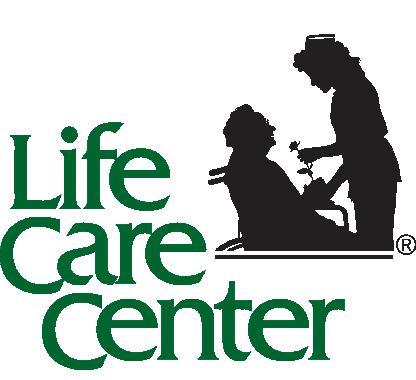
Village
The Cedars

1649 Spy Run Avenue, Fort Wayne, IN 46805 (260) 422-8520 • www.lcca.com
Rehabilitation Unit, Alzheimer’s Unit, Skilled-Licensed Nursing Or Intermediate Care, Therapies: Speech-Occupational-Physical, Long Term Care, Respite Care, Wound Care, Outpatient Therapy, Medical Transportation, Medicare/Medicaid, Pet Visitation Allowed
1350 West Main Street, Berne, IN 46711 (260) 589-3173 • www.swissvillage.org
Assisted Living, Rehabilitation Unit, Alzheimer’s Unit, Skilled Licensed Nursing, Semi-Skilled Nursing Or Intermediate Care, Therapies: Speech-Occupational-Respiratory-Physical, Long Term Care, Temporary Care, Private/Semi-Private Rooms, Pet Visitation Allowed, Hospice Care, Medicare and/or Medicaid
14409 Sunrise Court, Leo, IN 46765 (260) 627-2191 • www.thecedarsrc.com
Assisted Living, Skilled Licensed Nursing, Semi-Skilled Nursing Or Intermediate Care, Therapies: Speech-Occupational-RespiratoryPhysical, Long Term Care, Temporary Care, Private/Semi-Private Rooms, Pet Visitation Allowed, Hospice Care, Medicare and/or Medicaid
The Village at Anthony Boulevard 6701 S. Anthony Blvd., Fort Wayne, IN 46816 (260) 447-1591 • www.ABetterWayofLiving.org

Assisted Living, Rehab Unit, Alzheimer’s Unit, Skilled Licensed Nursing, Intermediate Care, Therapies: Speech, Occupational, Respiratory, Physical, Long Term Care, Temporary Care, Private/Semi-Private Rooms, Pet Visitation Allowed, Hospice Care, Medicare and/or Medicaid, Outpatient Therapy of Fort Wayne
The Village at Kendallville 351 North Allen Chapel Road, Kendallville, IN 46755-0429 (260) 347-2256 • www.ABetterWayofLiving.org

Rehab Unit, Skilled Licensed Nursing, Therapies: Speech, Occupational, Respiratory, Physical, Outpatient Therapy, Long Term Care, Temporary Care, Private/Semi-Private Rooms, Pet Visitation Allowed, Hospice Care, Medicare/Medicaid, 3 Years Deficiency Free Surveys
The Village at Pine Valley 9802 Coldwater Road, Fort Wayne, IN 46825 (260) 469-0600 • www.ABetterWayofLiving.org

Rehab Unit, Skilled Licensed Nursing Therapies: Speech, Occupational, Respiratory, Physical, Long Term Care, Temporary Care, Private/ Semi-Private Rooms, Pet Visitation Allowed, Hospice Care, Medicare and/or Medicaid, Outpatient Therapy


The differences between a functional and dysfunctional family prompt powerful opinions from a wide range of diverging views.
But there appears to be consensus forming from at least one perspective, according to studies: Planning for retirement is tougher and more complicated for middle-aged Americans who are single or married with children from previous relationships than it is for those with “traditional” families.
Those 40- to 65-year-olds with non-traditional families face more saving and investing challenges and are less likely to have a clear retirement vision. They also are less likely to have specific income vehicles, such as a 401(k)s, pension plans and annuities.
A lot of attention has been paid to the role gender plays in retirement planning, but family structure is also critical and often overlooked, said Sandra Timmermann, director of the former MetLife Mature Market Institute that conducted a study.
“This research shows that retirement planning for people in mid-life is strongly influenced by
family dynamics. We should not be ignoring how former spouses, stepchildren, and having no children influence savings and income for retirement as well as estate planning.”
Three mid-life segments of almost 1,600 respondents were identified in the study: traditional families, two parents with children from their current relationship; blended families, two parents with at least one child from a previous relationship; and single women, widowed, divorced or never-married women with or without children.
Among the survey’s major findings:
1. Blended families and single women report a significant disadvantage in retirement planning.
• Nearly seven out of 10 traditional families (66%) feel at least somewhat prepared for retirement, compared with 56% of blended families and only 40% of single women.
• More than half of traditional families have a clear idea of what they hope to experience when they retire, compared with only 38% of single women and 48% of blended families.
• Only two out of 10 single women and 29% of blended families contribute consistently

GOLDEN YEARS HOMESTEAD, INC.
A Christian Retirement Community
3136 Goeglein Road and 8300 Maysville Road Fort Wayne, IN 46815
Phone: (260) 749-6725, (260) 749-9655
www.goldenyearshome.org
* Independent Living
* Licensed Assisted Living
* Villas & Garden Apartments
* New Duplexes, Two & Three Bedrooms With Two & Three Car Garages
* Complete Healthcare Center, Including Medicaid & Medicare Certified
* Memory Care Neighborhoods
“ A Christian Ministry Dedicated To Serving The Seniors”


SWISS VILLAGE, INC.
1350 W. Main St.
Berne, IN 46711
Phone: (260) 589-3173
www.swissvillage.org
Duplex Homes, Independent Living Apartments, Residential & Assisted Living, Short Term Private Rehab Suites, Healthcare & Dementia Care, State Of The Art Wellness Pavilion, And Intergenerational Programming
to their retirement accounts, compared with 41% of traditional families.
• Roughly one in five blended families and single women expressed concern about the lack of safeguards to ensure that an ex-spouse will not lay claim to income or savings meant for themselves or their children.
2. Single women report specific challenges. They say they lack the safety net of a second income that their married peers have. A common sentiment is, “Because
I am a widow, I do not have the buffer of a second income from a partner.”
• Twice as many single women — 25% — do not own retirement savings/investment vehicles, compared with 13% of blended families, and almost three times that of traditional families (8%).
3. Help is wanted for “families like mine.”
• A significant portion of all families report a desire for financial advice tailored to their specific needs.
• Slightly more than half of single women long for retirement advice and tools designed for them.
• 45% of traditional families and 43% of blended families seek the same thing.
As one blended family respondent put it, “There is a lot to plan for...how long should I work, how much to save, how much to help my children vs. help myself and my future so my children are not taking care of me.”
Mature Life Features Copyright 2024
Retirement doesn’t necessarily signal the end of all efforts to add to your assets.
Whether you feel your nest egg is not big enough or subscribe to the you-can-never-have-enough school, there are still opportunities to enhance your estate during retirement.
One of the first things most retirees can investigate is the possibility of moving into a smaller house.
If your home is paid for, there are a variety of ways to exploit this position to improve your standard of living. You can check out the pluses
and minuses of a reverse mortgage, which allows you to borrow against your mortgage in regular payments, a lump sum, or a line of credit. The amount you take out does not have to be paid until you move out or the property is sold.
Or you can get your home appraised and shop around for a smaller, less expensive residence, pouring the difference in real estate prices into your retirement portfolio.
You might even consider moving to a less expensive part of the country. Compare real estate prices, and the income and property tax rates where you live now with other sections of the nation.
Besides pulling in a lump sum
from the sale of your home and acquisition of a lower priced house, you can also cut other costs — taxes, insurance, and, in some cases, residential upkeep. These savings will help boost your standard of living by lowering day-to-day expenses.
Another way to pay your bills in retirement is to work part time.
If you earn $10,000 a year, that’s $10,000 a year less you have to pull out of your nest egg and gives that amount an additional year to grow.
You can get answers to a lot of the questions these matters raise by checking with your financial advisor or online at aarp.org.

THE CEDARS 14409 Sunrise Court Leo, IN 46765 Phone: (260) 627-2191
www.thecedarsrc.com
Complete Retirement Amenities: Skilled & Intermediate Long Term Nursing Care, Assisted & Residential Apartments, Total Rehab Unit, Villa Of The Cedars With Condominium Homes - “Come To The Country”


www.lifecarecenteroffortwaynein.com
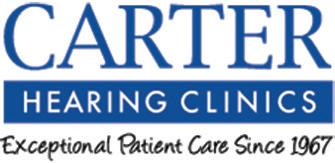
CARTER HEARING CLINICS 1335 Getz Road, Fort Wayne, IN 46804
NORTHEAST: 3136 Goeglein Rd., Suite A Phone: (260) 436-6400 or (877) 436-6401
www.carterhearingclinics.com
• Creating A Higher Standard of Care
•
Yesterday, I walked in the house and casually asked Mary Ellen, “You haven’t had a chance to call the plumber yet, have you?”
“Why do you have to be so negative?” she asked.
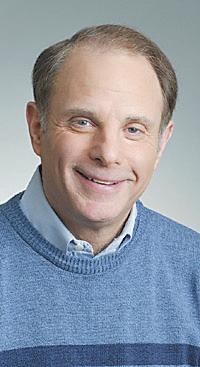 NUTSHELL
By DICK WOLFSIE
NUTSHELL
By DICK WOLFSIE
“I’m not being negative, Mary Ellen. I don’t know what you mean. Didn’t I just ask a question?”
“See, there you go. In that one response you used three negative words. You could have said, ‘I am a positive person. I’d like to know what you mean. I always try to be agreeable.’”
This was not a discussion I was looking forward to. Not then, not ever. Oh dear, three nots.
Time for lunch.
“Mary Ellen, we don’t have any peanut butter, do we?”
I did it again. Maybe Mary Ellen was right. I asked for advice on how to change.
“Next time, Dick, simply ask: ‘Do we have any peanut butter?’” I was guilty as charged, of course, and she was not about to drop the topic. Not while she was on a roll.
“Mary Ellen, this is not fair. We’ve been married a long time,
haven’t we? You haven’t ever mentioned this issue before.” Okay, that was three negatives right there. “This is not an easy thing to stop doing. Don’t you agree?”
I decided to show my wife that this was not really an uncommon way for people to communicate. Before she returned from shopping this afternoon, I purposely didn’t shut the garage door and I didn’t turn the lights off in the kitchen. I also didn’t check the dishwasher contents before starting it. And I didn’t feed the cat. When she returned, I’d hear about all the things I didn’t do. And I’d be told, “don’t do them again.”
When Mary Ellen walked in the door, she approached me. I was ready for her to explode with negativity. “In the future, Dick, please remember to close the garage door when you come home. And you left all the lights on in the house. Let’s try to save on electricity. By the way, the cat is meowing. Make sure to feed her when I am gone. It also appears you ran the dishwasher half loaded. We should always try to conserve water.”
“No, no, no, Mary Ellen; a typical wife would not respond that way when her husband messed up so many things.”
“That’s four negatives, Dick. You’re getting worse at this.”
I told Mary Ellen what I thought most wives would say in a similar situation.
“Don’t leave the lights on in
the middle of the day, Dick.”
“Don’t leave the garage door open when you get home.”
“Don’t forget to feed the cat.”
“Don’t run the dishwasher half-loaded.”
“Sorry, Dick,” she responded, “I’m a positive person. I would
ne...ne...
“Yes, say it, say it, Mary Ellen! Say the word ‘never.’ It will help you get out of this positive rut you are in.”
“Ne...nearly every day I strive to be optimistic. And I do that by using positive words. Do you see
the difference?” I wanted to say “I don’t,” but that would have really gotten me in trouble.
Instead, I decided to play it safe and repeat something smart I said almost 44 years ago: “I do.”
You’ve probably done some bartering without realizing it.
Anyone who’s traded in a car has, by definition, done bartering: your old car and some cash for a new model.
True bartering, of course, usually precludes money, and in these stark economic times, bartering — the oldest form of commerce — has become more widespread.
So what can you trade?
Anything somebody else wants if that somebody has something you want.
Are you a retired accountant? You can do the tax returns for someone who will, in return, provide gardening services for your property.
A relative recently traded his ability to make furniture to a dentist for two crowns and a bridge.
Bartering with neighbors can be simple. Offer to keep an eye on their pets when they’re away
from home in exchange for free trips to the airport when you go on vacation. Or you might offer him that saxophone you no longer play for the electric lawnmower he no longer uses since he replaced his grass with a stone-and-concrete patio.
Economists have a saying: nothing happens until somebody buys something from somebody else.
Bartering requires a twist: nothing happens until somebody else wants what you have to offer.
You might want to take those old picture frames to a local flea market or swap meet or block sale as an offering for something you might want.
Cyberspace has opened up a whole new universe for the exchange of goods for other goods, or services for other services, or goods for services and vice versa.
There are several websites to choose from, so shop selectively.
An acquaintance had an uninvited swarm of bees removed from his tree by a nearby resident who wanted the pollen-
gatherers for his small backyard orchard. That was a barter: bees for their removal. Both parties were content with the outcome.
According to U.S. News and World Report, a New York attorney offered to prepare a simple will and healthcare proxy in exchange for the services of an experienced floor sander or painter. A San Francisco entry sought to trade two sets of luggage for beer or wine for her son’s baptism party.
When you plan a vacation, consider house-swapping if your budget is being bent. You can hunt for a villa around Venice or a cottage near Cork. Again, there are Internet sites you can roam for possibilities.
If the homeowner is interested in visiting your part of the world, you can talk business — or barter.
But barterer beware: most sites discussed here do not screen users, so you have to do be responsible for doing your own checking on the reliability of whoever you deal with.
Mature Life Features Copyright 2024
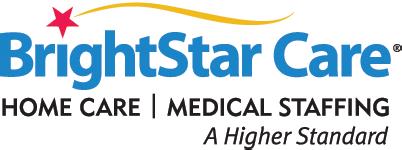
BRIGHTSTAR
333 E. Washington Blvd.
Fort Wayne, IN 46802
Phone: (260) 918-0933
www.brightstarcare.com/fort-wayne
Enthusiastic, kind personal level client care connection, 24/7 support enables clients to check on loved ones. Rigorous caregiver screen/background check ensures optimal security & family peace of mind.



3182 Mallard Cove Lane Fort Wayne, IN 46804
Phone: (260) 484-5858
MollyTritch@comfortkeepers.com
Comfort Keepers

Michael F. Barile, D.C., P.T. 3030 Lake Avenue
Fort Wayne, IN 46805
Phone: (260) 420-4400
www.hoosierpt.com
Medicare Assignment Accepted “Personalized Care”


Mark your calendar for Thursday June 27. The Senior Expo will be on this day from 8 a.m. to 1:30 p.m. The Senior Expo will be at Huntington North High School Fieldhouse.
Huntington North School Athletic Department will be selling their Senior Citizens Silver Pass for those 62 years and older for $10 each. This pass will be good for the 2024-2025 school year for all regular season home events at Huntington North High School. Passes can be purchased at their booth. Many door prizes will be given away throughout the day. Attendees have an opportunity to win additional prizes through the Expo’s Passport Program.
The “passport” document is given to attendees at the entrance, lists every exhibitor booth. Visitors take their passports to the booths and the exhibitors will stamp their corresponding space on the document. Visiting half of the Expo’s booths qualifies the passport holder to be entered for a special drawing for one of 12 $50 gift cards. Free meals will be available to the first 400 for breakfast provided by American Senior Communities. The Waters of Huntington will provide a delicious lunch.
Free all-day entertainment is featured on an easily viewed stage. Performances include: The Alley Kats, Frank Sinatra Tribute



Artist (Russ Weed) and Joe Justice. Elvis is taking a hiatus this year and hopes to resume shows sometime in the future. All of this will be announced by a professional D.J. Other unique features at the Huntington County Senior Expo include golf cart transportation between the parking lot and the fieldhouse and wheelchair accessibility within the facility.
The Huntington County Senior Expo continues to grow with help from corporate sponsors including Myers Funeral Homes, The Waters of Huntington, American Senior Communities, Young Electric, Schroeder Automotive, and TWN Communications. Their
involvement and support ensure a high-quality event for the community.
Be sure to mark your calendar for Thursday, June 27 anytime from 8 a.m. to 1:30 p.m. and have a fantastic time at the Huntington
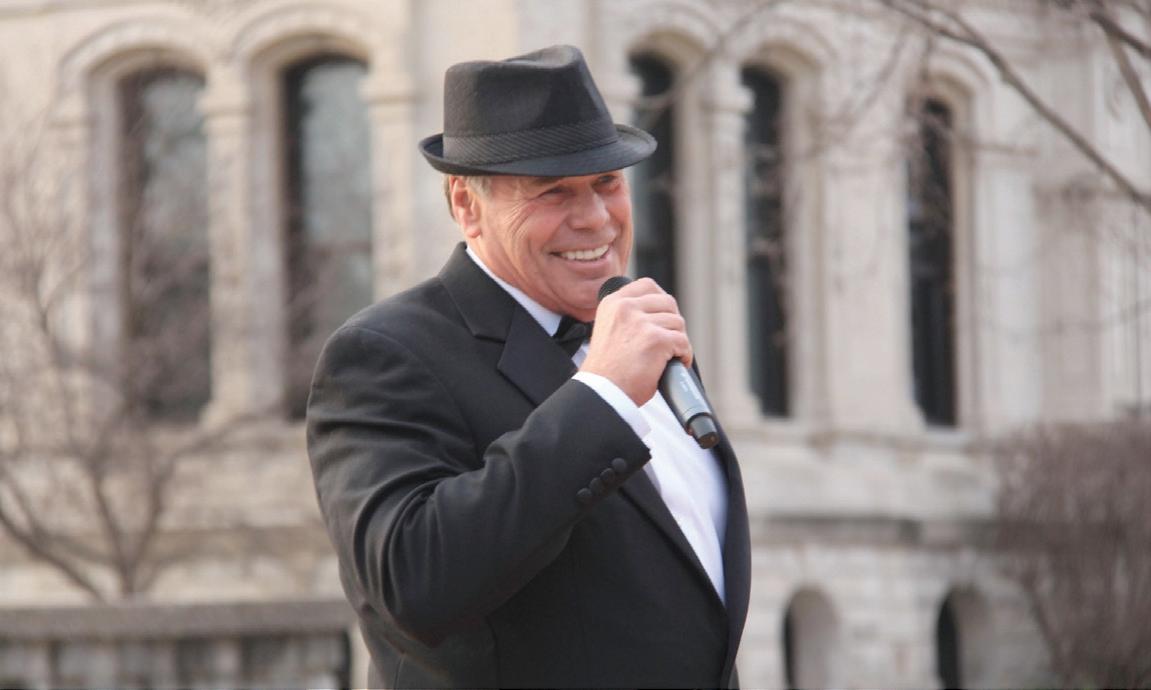










About the only time most of us take the time to take notice of “time” is when we must keep an appointment, find out when our favorite television program is aired, or cuss out the confounding “Daylight Savings Time,” which we changed recently for the umpteenth time since World War I about a century ago.
But there’s much more to time. The globe is divided into time zones — longitudinal north-south geographic sectors that observe a uniform area for legal, commercial and social purposes. There are 24 time zones circling the globe.
Each zones covers 15 degrees (60 miles a degree) longitudinally. However, they often follow the boundaries between states and countries and their subdivisions instead of strictly sticking to longitude degrees because it is convenient for areas in frequent communication to keep the same time … like railroads, airlines and communications networks.
The British Royal Observatory in Greenwich, England, which was founded in 1675, established “Greenwich Mean Time,” which is the solar time at that geographic location. Astronomers developed GMT as an aid to mariners to determine their longitudinal location at sea. Today, U.S. military units refer to GMT as “Zulu Time.” So, no matter the location on the globe, there always is a time constant for all military personnel.
In the 19th century, as transportation and telecommunications improved, it became increasingly inconvenient for each location to observe its own solar time. In November 1840, the Great Western Railway started using GMT kept on portable chronometers. This practice was soon followed by other railway companies in Great Britain and became known as “Railway Time.”
In August 1852, time signals were first transmitted by telegraph from the Royal Observatory. By 1855, Great Britain’s public clocks were using GMT but it didn’t become England’s legal time until 1880.
Time-keeping on North American railroads in the 19th century was complex. Each railroad used its own standard of time, usually based on the local time of its headquarters or, more important, its terminus. The railroad’s train schedules were published using its own time. Some junctions served by several railroads had a clock for every railroad company, each showing a different time.
In 1863, Charles F. Dowd proposed a system of hourly standard time zones for North American railroads. He took this action without consulting the railroads. Rail officials weren’t consulted on the matter until 1869.
In 1870, Dowd proposed four ideal time zones for the United
States, having north-south borders with the first centered on Washington, D.C. But, by 1872 the first time zone was centered on the meridian 75 degrees west of Greenwich. Dowd’s system was never accepted by North American railroads.
Instead, U.S. and Canadian railroads implemented a version proposed by the Traveller’s Official Railway Guide. The borders of its time zones ran through major cities’ railroad stations.
Canadian-born Sanford Fleming proposed a worldwide system of time zones. His proposal divided the world into 24 time zones. All clocks within each zone would be set to the same time as the others but differing by one hour from those in the neighboring zones. He advocated his system at several international conferences, including the Interna-

tional Meridian Conference, where it received some consideration. Today, his system has not been directly adopted, but some maps divide the world into 24 time zones.
By 1900, almost all inhabited locations on Earth had adopted a standard time zone, but only some of them used an hourly offset from GMT. Many applied the time at a local astronomi-
cal observatory to an entire country, without any reference to GMT.
It took many decades before all time zones were based on
Continued on page 16
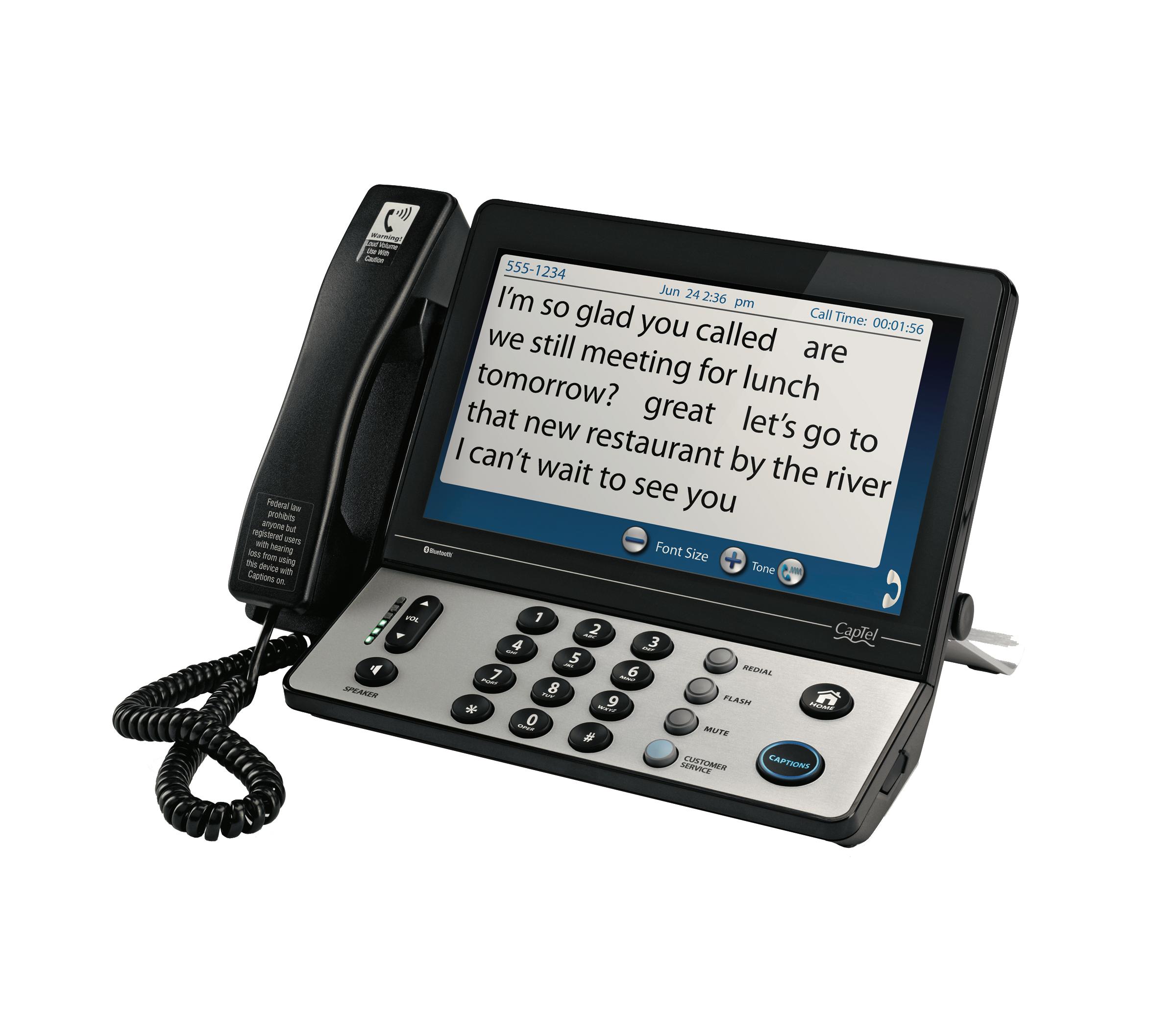


COMMUNITY CONCERTS Fort Wayne Parks and Recreation’s Foellinger Theatre announces the return of free community concerts in June and July. Photo provided.
Fort Wayne Parks and Recreation’s Foellinger Theatre announces the return of the much-loved, free community concerts in June and July. All are welcome to take a seat in the covered outdoor theatre to experience live music on the hillside.
The schedule is:
June 11, Fort Wayne Area Community Band, 7:30 p.m., “Music for All Ages.”
July 9, Fort Wayne Area Community Band, 7:30 p.m., “Salute to America.”
July 17, New Millennium Jazz Orchestra, 7:30 p.m., “25th Anniversary Show.”
July 26, Fort Wayne Children’s Choir, 7 p.m., “Choral Week Capstone.”
Refreshments will be available at reasonable rates at the concession stands.
For more information about
concerts and events at the Foellinger Theatre, visit FoellingerTheatre.org.
Inclement weather procedure: Any program changes, facility closures or other weather-related adjustments will be posted to the FWPRD social media pages and website. If the mayor declares an emergency, all parks and recreation facilities and programs will be closed or cancelled.


The kids are raising their own kids, you no longer have to report for work, and yardwork is getting to be more problem than pride.
All of these thoughts lead to a major mental exercise: is it time to sell the old homestead and downsize? Should you buy a smaller house? Or maybe a condo?
Integral in your thinking has to be the possibility that your new quarters could be governed by a homeowners association.
About three-quarters of the population live in communities ruled by HOAs.
This means their quality of life and aesthetic choices are dictated by outside forces.
Before you decide to gather a down payment for whatever residence you choose, find out if the development is ruled by a HOA and get a copy of its rules.
lead to a fine, and you have to correct or stop what you’ve done.
HOAs control the exterior look of your dwelling. They can control or ban the type of trees and shrubs you can grow, order you how to maintain your lawn and landscaping, dictate the design and way you mount your property’s address on your dwelling, and dictate what time you place your trash cans on the street for pickup.
Some associations even control whether or not you can add electrical outlets in your dwelling.
The kind and number of pets is usually on their list of restrictions, as are regulations involving the type and number of vehicles you’re allowed. If you own a recreation vehicle or motorhome, don’t expect to be allowed to park it on what you believe is your property. In fact, your balcony or deck might be deemed “common property” and prohibit you from storing your barbecue grill there.

Continued from page 15 some standard offset from GMT, also known as “Coordinated Universal Time.” By 1929, the majority of countries had adopted hourly time zones, except Iran, India and parts of Australia which have time zones with a 30-minute
offset to UTC. Today, all nations currently use the UTC time zone system, but not all of them apply the concept as originally conceived. Several countries and subdivisions use half-hour or quarter-hour deviations from standard time. China and
Their control can range from how often you can park your car in the driveway to the color of your drapes that can be seen from the street.
Don’t confuse these rules and regulations with a legal code. Any breach of these rules can
Whether or not you think any of these or other rules sound petty, you still have to live by them if you decide to move into the property.
Mature Life Features Copyright 2024
India use a single time zone even though the extent of their territory far exceeds the ideal 15 degrees of longitude for one hour.
Others, such as Spain and Argentina, use standard hourbased offsets, but not necessarily those that would be
Learn about the benefits of living in a Continuing Care Retirement Community like Golden Years.



What if you had all the freedom and privacy of living in your own home with none of the worry about repairing the roof, keeping the furnace running, shoveling snow, or cutting grass? All the joy of your own home with none of the hassle. If the dishwasher breaks, we’ll fix it. Just relax. We’ll take it from here.
FEATURES
◆ Four floorplans to choose from ranging from 1289 to 1900 square feet
◆ 2BR, 2BA with a 2 car garage

determined by their geographical location. The consequences in some areas can affect the lives of local citizens and, in extreme cases, contribute to larger political issues, such as in the western reaches of China. In Russia, which has 11 time zones, two zones were removed in 2010, but were reinstated in 2014.
When I was a boy, my grandfather could look up at the sun and tell within 30 minutes, what time it was. He’d

check himself by looking at his pocket watch as the trains came through town. Those were bygone days.
When I was with him, I never missed a meal. He always knew when to call “Bean Time.” Of course, the sounding of the town’s work siren helped when it sounded at 7 a.m., noon, and 5 p.m., telling everyone when to begin and end work … but that’s another story.
Mature Life Features Copyright 2024







Text and Photos
By CECIL SCAGLIONE Mature Life FeaturesIf you want to have fun riding a horse, grab the grandkids and head for the carousel nearest you.
If you want to enjoy riding a horse, head for a dude ranch — a real working ranch like this one, not a flossy facility with spa, bowling alleys, golf course and movie theater.
Latigo Ranch is nestled some 9,000 feet above sea level, a couple of hours north of Denver. It’s been turning tenderfeet into horse-sensible riders since 1929 by walking, loping and trotting through the aspen- and fir-coated hills with such distracting views that the half-ton horse under you learns to relax with its rider.
“We get a lot of seniors,” said co-owner Randy George, who also wrangles up the meals that satisfy both stomach and spirit. “A lot of grandparents with grandchildren.”
In many cases, the youngsters go riding while the seniors rock and read on the porch of one of the cozy cottages — they’re called bunkhouses here — under the mountain-propped skies.
It’s never too late to learn the rudiments of riding, however. To satisfy your interest, visit their website at latigotrails.com.
Working a horse is not like training a dog, George said. “A horse doesn’t understand punishment.
“A horse wants to be comfortable. It doesn’t like to be uncomfortable.”
You’re here to learn how to ride, and you’re also training your horse. A horse will only do two things: what you let it do or what you tell it to do.
Horses don’t like to be ridden. They don’t go out and look for riders, we were told.
There are a couple of “nevers” to wrap in your wrangler’s word-book. Never walk behind a horse. Give its rear a wide berth. And never walk up too quietly to a tethered horse. It could be asleep and you’ll startle it. Since horses are prey animals, they’re built to bolt, and they spook easily.
Mounting from the right is more tradition than technique. Back in the days when men wore swords, most people were right-handed and their swords were worn on the left. They got in the way if you tried to mount or dismount on the right side of the horse.
Learning all this is worth it after you’ve poked all the precautions into your psyche and introduced yourself to the horse by approaching it from the front and sliding onto the smooth leather saddle that gives you a view from about twice your height.
After, of course, you’ve snugged up your stampede string. This is a hat or cap retainer that slips under your chin so your headgear won’t blow off and startle your
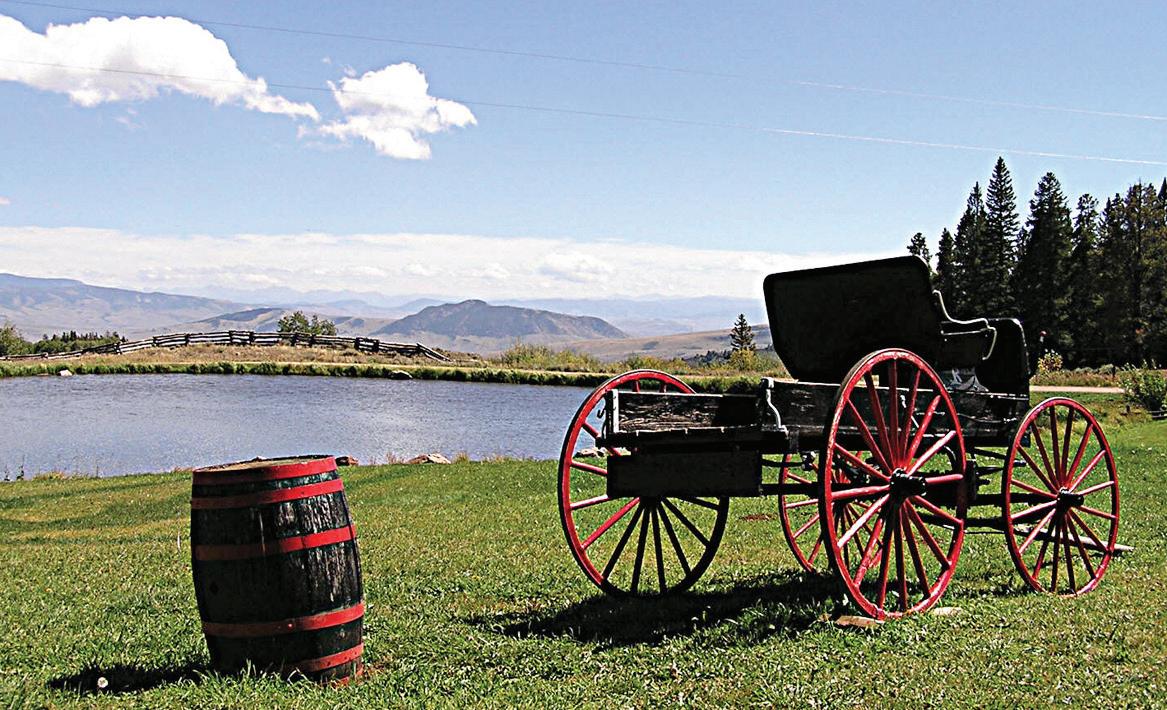
horse or any of those around you.
Keeping a “smile” in your reins, which you hold like an ice cream cone, you squeeze your legs to signal the horse to move forward. Prod it with your heels if it doesn’t respond, and kick it a bit harder if it still doesn’t move.
A lesson you learn aboard the beast is that its eyes are built so it can look back at you. It monitors you constantly. Look where you want to go before pulling your reins to turn that way, because the horse is looking at you to see if that’s the way you want to go.
The sense of satisfaction that comes with smoothly straddling a creature you can whisper to as you soak in the scenery is akin to that of learning how to ski or snorkel. It’s a gut glow.
Before getting to the next steps in my skill- and relationship-building with horses — overnight camping treks, cutting cattle, and rounding up strays in the surrounding hills — it was time to sample another side of northern Colorado.
As planned, we drove to the western edge of the state to tour the wineries peppered around Grand Junction, where the Gunnison River joins the Colorado.
These oenological outposts are less pretentious and more fun than their more formal

cousins in Northern California.
While sipping a sirah at Grande River Vineyards, we visited the rows of vines outside the main office that were labelled with the description and derivatives of the dozens of varieties of grapes grown here. Honey-based wine designed to drench ice cream was the main attraction at Meadery of the Rockies and Carlson Vineyard offered a cherry wine that becomes deliciously decadent by dipping the rim of the glass in melted chocolate before pouring.
Between stops for sips, you can drive up to Colorado National Monument, the massive bluff overlooking the Grand Valley, for vast vistas of this land of clouds, canyons, mountains and mesas.
Mature Life Features Copyright 2024























NORMANDY BEACHHEAD,

JUNE 16, 1944 — “I took a walk along the historic coast of Normandy in the country of France. It was a lovely day for a stroll along the seashore. Men were sleeping on the sand, some of them sleeping forever. Men were floating in the water, they didn’t know they were in the water, for they were dead.
“The water was full of squishy little jellyfish about the size of your hand. Millions of them in the center of each of them had a green design exactly like a four-leaf clover. The good-luck emblem. Sure, hell yes.
“I walked for a mile-and-ahalf along the water’s edge of our many-miled invasion beach. You wanted to walk slowly for the detail on that beach was infinite.
“The wreckage was vast and startling. The awful waste and destruction of war, even aside


from the loss of human life, has always been one of its outstanding features to those who are in it. Anything and everything is expendable. And we did expend on our beachhead in Normandy during those first few hours.”
Those were the opening paragraphs of Ernie Pyle’s newspaper dispatch the day after the Allies stormed the Normandy beach in World War II. The story, which went to hundreds of newspapers in the U.S., was entitled “The Horrible Waste of War.”
This article and many others, along with the stories behind them, are on display at the Ernie Pyle World War II Museum in his hometown of Dana. The house in which he was born in 1900 sits next door to the museum and is also open to the public. The Friends of Ernie Pyle are dedicated both to preserving the memory of America’s most beloved WWII civilian newspaper correspondent and the GI’s whom he admired and wrote about in his daily column.
Inside the first of two Quonset huts that comprise the museum is a 10-minute video presentation of Pyle’s life as a roving reporter and then as a war correspondent starting in England, slogging through
Continued on page 19








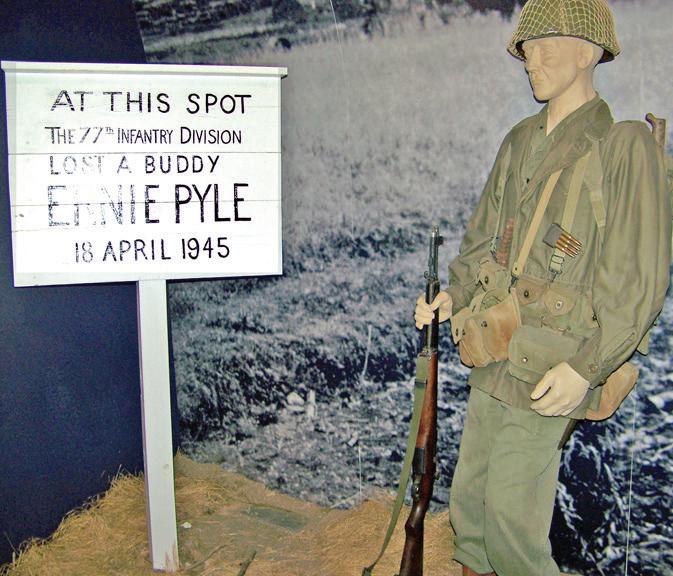
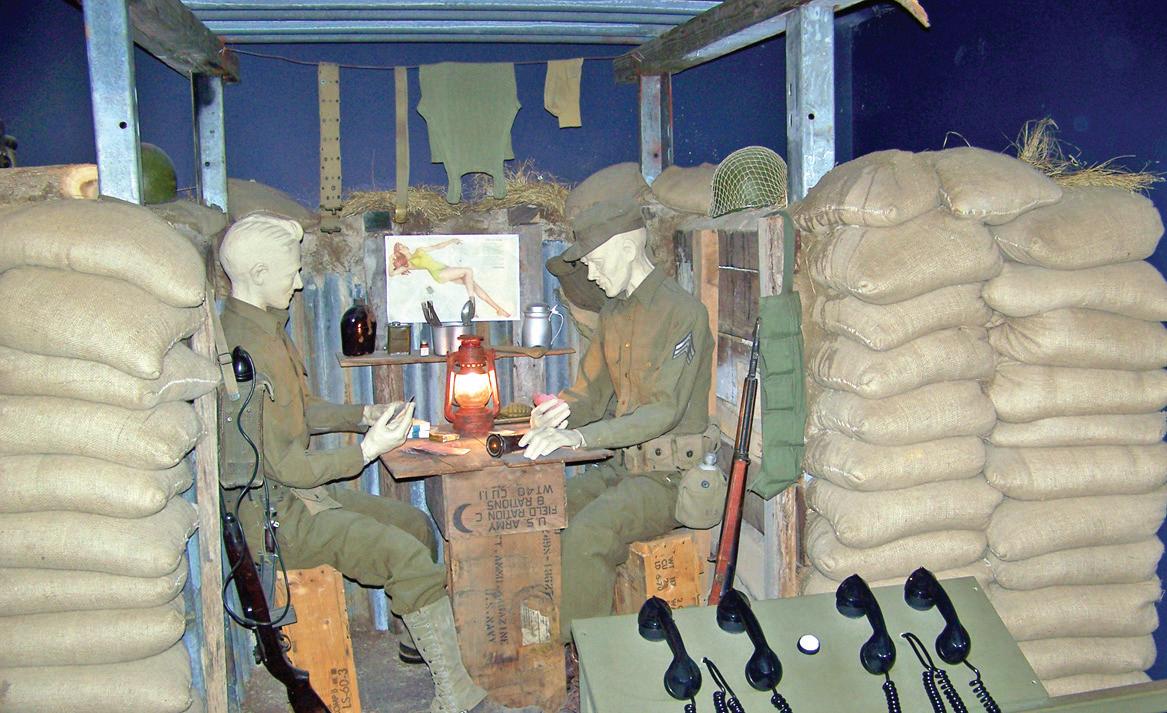



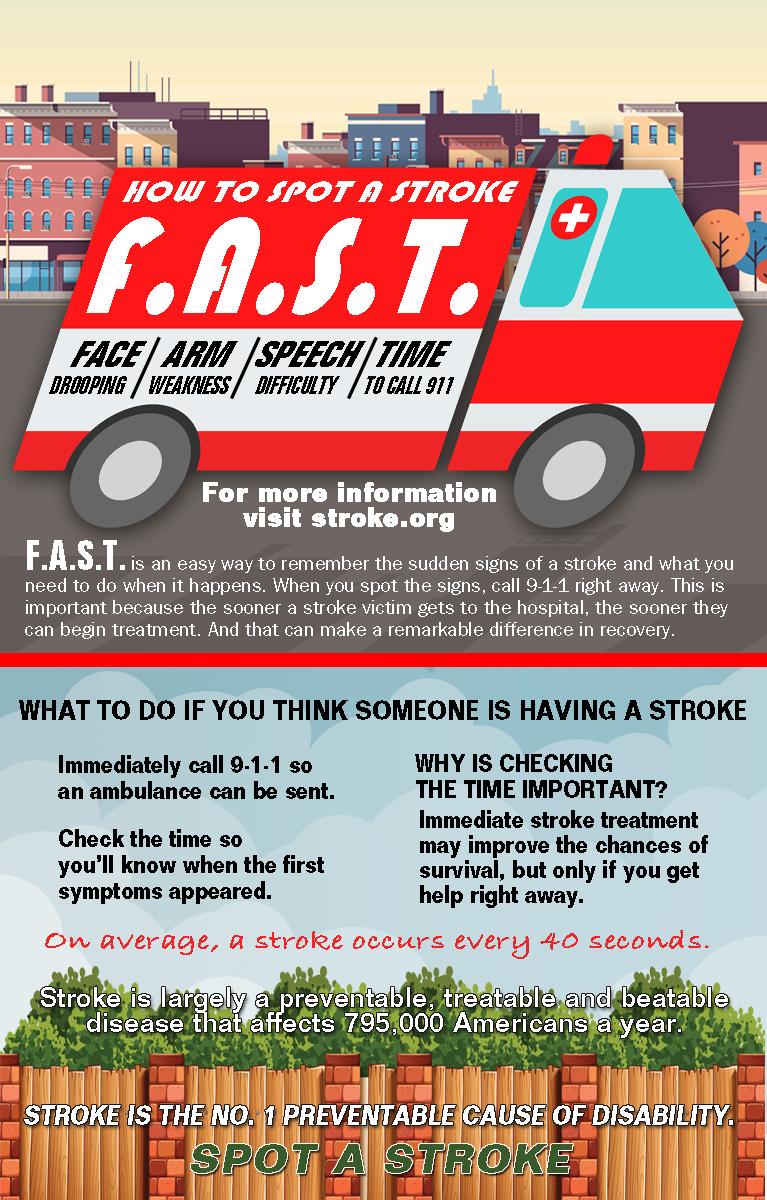
Motorcoach Tours 1404 E. Lake Bluff Dr. Kendallville, IN 46755
JUNE 27 South Bend Treasures: Notre Dame Campus, Tippecanoe Place Lunch, Oliver Mansion, Studebaker Museum
JULY 8-10 Three Day Mystery???
JULY 20 Let’s Ride in Saugatuck MI. Dune Buggy, Boat Cruise & Exploring Downtown
AUG 5-9 New York
Finger Lakes: Strawberry Fields Farm, Belhurst Castle, Montour Falls, Sonnenburg Mansion, Two Lake Cruises, Lucille/Desi Museum, & More
AUG 8 BEAUTIFUL, The Carole King Musical, Warsaw Wagon Wheel, Lunch too.
AUG 21 One Day Mystery
AUG 23-25 Blue Moon
Over Kentucky: Bluegrass Music Hall of Fame, Bill Monroe Birthplace, Rosine General Store/Barn, KY BBQ w/Bluegrass concert, Bluegrass Gospel Brunch
SEPT 14-21 The COAST LAKES, & The COG, Maine & New Hampshire
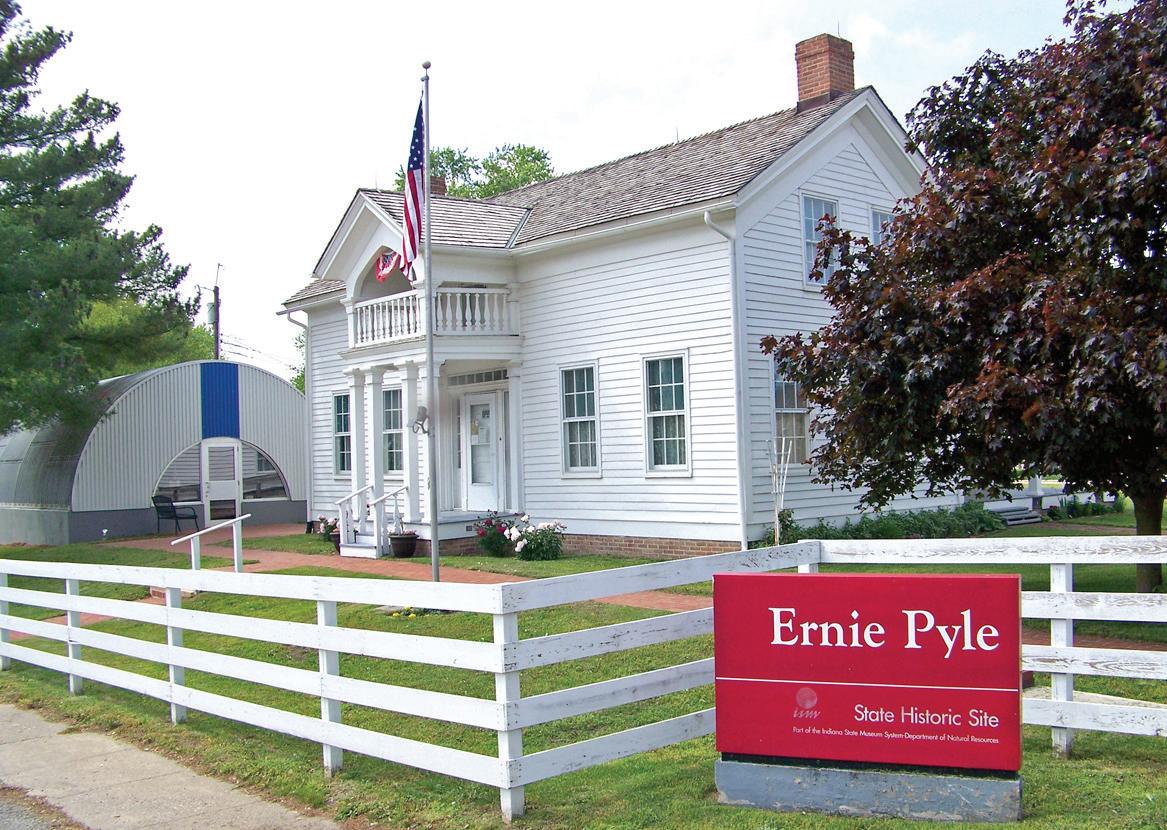
France, Italy and Sicily and finally in the Pacific Theater.
Pyle never dealt with the statistics of the war, but had a way of relating what was going on to the folks back home through the eyes of the everyday soldier.
The hands-on museum features vignettes of the war from a sandbag dugout in Italy similar to one where he wrote many of his columns, and a room-long diorama of the Normandy beach head to a scene of a GI encampment with a Jeep and the final display, which is a sign that reads, “At this spot, the 77th Division lost a buddy, Ernie Pyle, 18 April, 1945.”
That’s when Pyle was killed by an enemy machine gunner on Shima, an island near Okinawa. He was 44 years old.
Throughout are enlargements of articles like the rather humorous one he wrote about the work horse of the infantry, the Jeep, and another about how the night Capt. Waskow was brought down the mountain on the back of a mule and the reaction of his men to his death. Pick up a field phone and hear the voice of well-known actor William Windom of “Murder
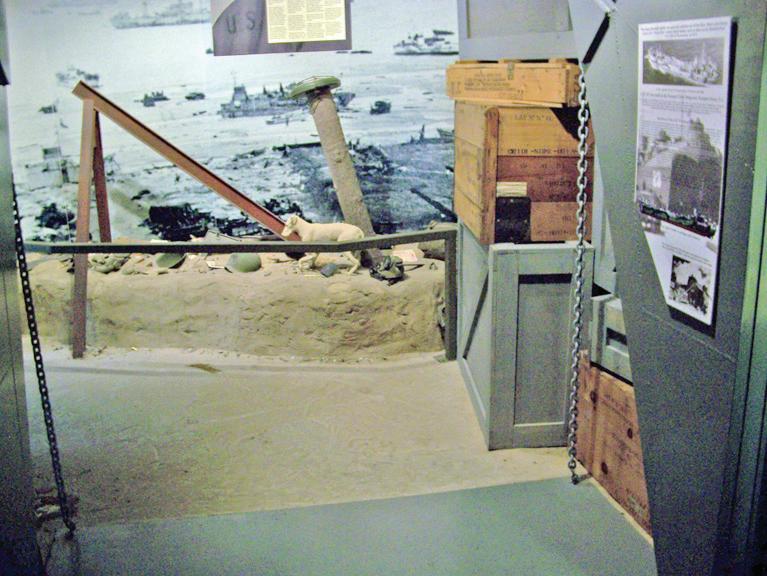
She Wrote” fame relating the stories behind the scene in front of you.
For a microcosm of World War II and Pyle’s view of the action, plan to visit the Ernie Pyle WWII Museum in Dana. Head over to Interstate 69 and take it south to Interstate 465 at Indianapolis and go west to US 36 (Rockville Road). Then drive west for about an hour and 20 minutes through the towns of
Rockville and Montezuma to IN 71N (County Road 300W) and turn right (north). Just a couple minutes up the road is Dana. Cross the railroad tracks and you’ll see the house and museum on the left.
It is open May 3 through Veterans Day, Nov. 11. Hours are from 10 a.m. to 5 p.m. Fridays and Saturdays and from noon to 5 p.m. Sunday. No admission fee.
Fearful flyers have had a lot of time to think about when and whether or not to board another airliner.
Researchers report as many as one out of three people is either afraid or anxious about flying. Data also reveal one out of every four passengers aboard any flight is a white-knuckler.
A late colleague logged thousands of miles in his constant global search for top-grade material for his company, but he remembers none of them. The only way he could get himself to board a plane was to fortify himself with booze so he could
fall asleep immediately after he buckled himself in.
Airlines boast of their safety record, and rightly so. Flying ranks atop the list of travel methods for safety, speed and cost.
But senior travellers who can take their time to get around can shop for a cruise ship to transport them comfortably to and from Rio or Rome without having to be crowded into an uncomfortable seat in an uncomfortable metal tube.
Another maritime alternative is a freighter. While the quarters aren’t as luxurious as a megaliner, they can be just as comfortable at a third of the cost.
The COVID-19 shutdown and
border closings gave everyone a new look at daily living and time to consider how they’re going to live the rest of their lives.
Visiting friends and family has climbed higher up to the travel ladder and, since many of them are within these borders, driving can replace flying.
The airlines are squeezing you into a tight seat after you’ve manhandled whatever luggage you’re allowed through airport gates, security, and crowds.
There’s no doubt flying still is the safest and quickest way to get you there. This becomes especially attractive the farther away your destination is. But it’s not stretching the truth when you say it’s not fun anymore.

An overpayment occurs when Social Security pays a person more money in Social Security benefits or SSI payments than should have been paid. The amount of the overpayment is the difference between the payment received and the amount that was due.
Social Security is required by law to adjust benefits or recover debts when an overpayment occurs. If you receive an overpayment notice, it will explain why you’ve been overpaid, the overpayment amount, your
repayment options, and your appeal and waiver rights.
After receiving an overpayment notice, you can:
• Repay the overpayment in full or through a repayment plan by check, money order, credit card or by monthly reductions from your Social Security benefit. You may be able to make a full or partial repayment using Pay.gov or your bank’s online bill pay option. We offer flexible repayment plans, including payments as low as $10 per month.
• Appeal the overpayment if you don’t agree that you’ve been overpaid, or you believe the amount is incorrect. You


•
•
•
•
•
•
•
•

can request a non-medical reconsideration online or you can submit a completed SSA-561, Request for Reconsideration, to your local Social Security office.
• Request that we waive the overpayment if you believe you are not at fault for causing the overpayment AND you cannot afford to pay the money back or it is unfair for some other reason. You can ask for a waiver by submitting a completed SSA-632, Request for Waiver of Overpayment Recovery, to your local office. If your overpayment is $1,000 or less, we may be able to process your waiver request quickly by telephone. You can contact your local office or call us at (800)772-1213, 8 a.m. to 7 p.m. Monday through Friday.
• Request a different repayment amount if you are unable to meet your necessary living expenses due to the current repayment amount. If you are unable to repay the debt within 60 months* due to the negotiated repayment amount, you will be asked to complete form SSA-634, Request for Change in Overpayment Recovery Rate. You can find the form at ssa.gov/ forms/ssa-634.pdf.
*This is a recent policy change. Previous policy required the completion of the SSA-634 if the overpayment could not be repaid within 36 months.
To learn more about overpayments and our process, visit our Understanding SSI Overpayments webpage at ssa. gov/ssi/text-overpay-ussi.htm, read our Overpayments fact sheet at ssa.gov/marketing/ assets/materials/EN-05-10106. pdf, or watch our Overpayment video at www.youtube.com/ watch?v=pxYYcjqkFvM.

WHAT TO DO ABOUT AN OVERPAYMENT Social Security provides various options should you receive an overpayment notice.
• Private apartment with full, private bathroom
By KURT NESS Broker/Co-Owner/Auctioneer Ness Bros. Realtors and AuctioneersLet us help you work through your downsizing process and evaluate your current situation, desired outcome, obstacles to overcome and the cost of doing nothing.
Although people realize that downsizing to the right size in the future would be extremely helpful and have many advantages, taking the steps to begin the process can feel daunting.

• Kitchenette with sink, refrigerator and microwave
• Individually controlled



Unfortunately, as time marches on the obstacles tend to grow and energy tends to diminish until either an emergency forces the decision or greater help is required.
Obviously, we encourage being proactive rather than reactive. Adding a move and a multitude of decisions to an already stressful health situation can greatly increase the anxiety and stress of the process.
Additionally, many retirement or assisted living communities and homes are not always available at a moment’s notice. Many have lengthy waiting lists and vetting processes that must be traversed.
We will gladly help you navigate the entire process for you or your loved one. The earlier you begin, the better prepared you will be for your desired outcome.
You can reach out to one of our downsizing, relocation specialists at (260) 459-3911 in Fort Wayne or (260) 359-3911 in Huntington. You can also contact us through our website NessBros.com or stop in our offices, located at 3344 Mallard Cove Lane, Fort Wayne, and 519 N. Jefferson St., Huntington.
